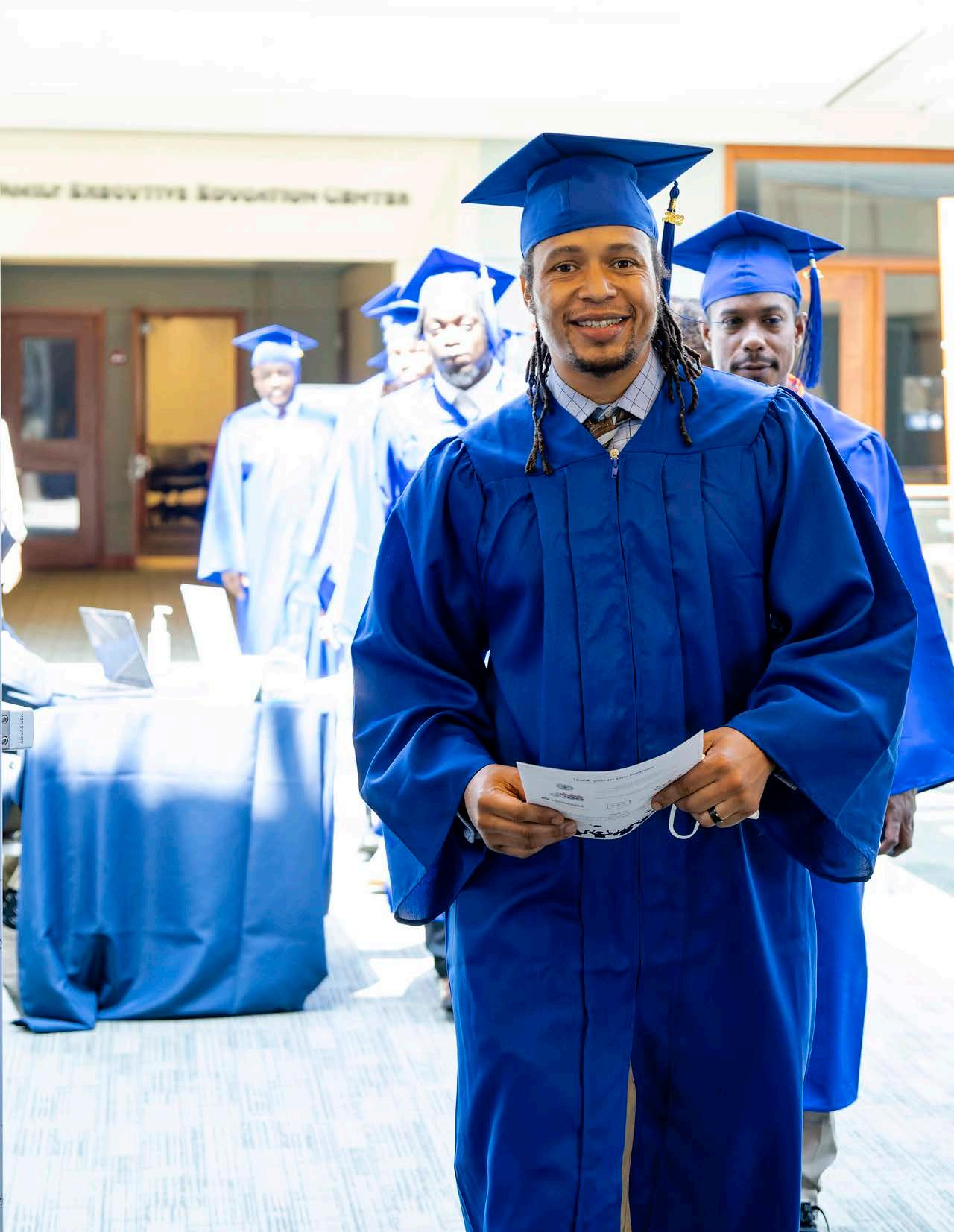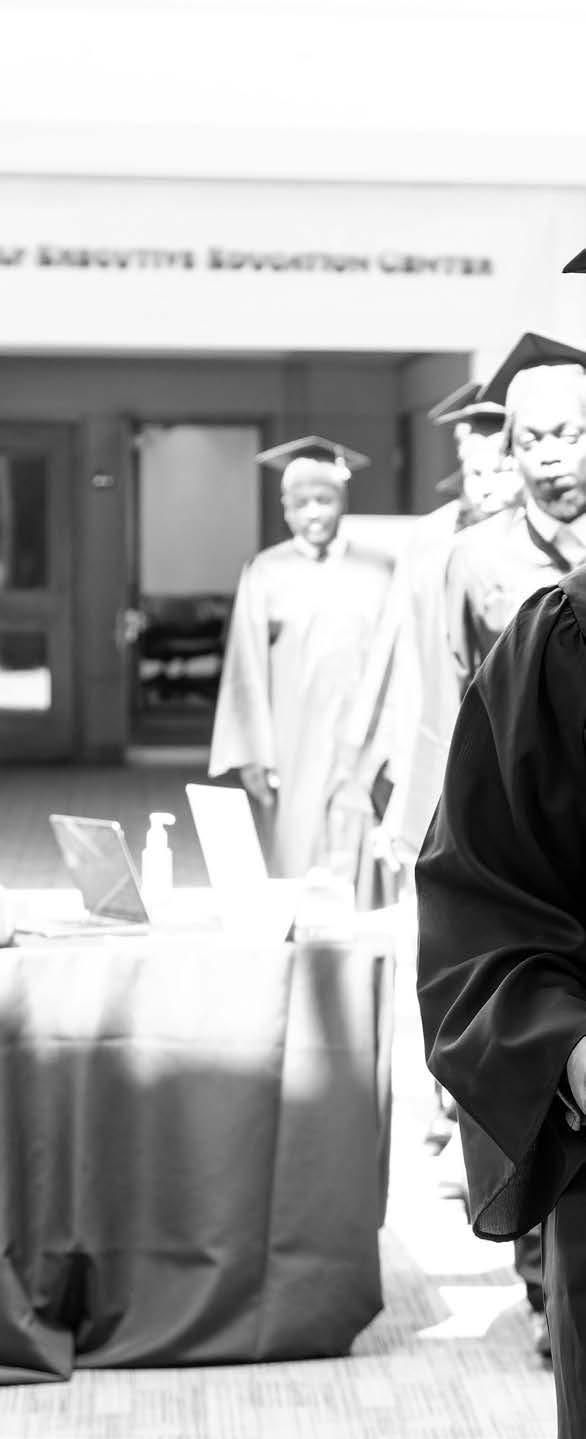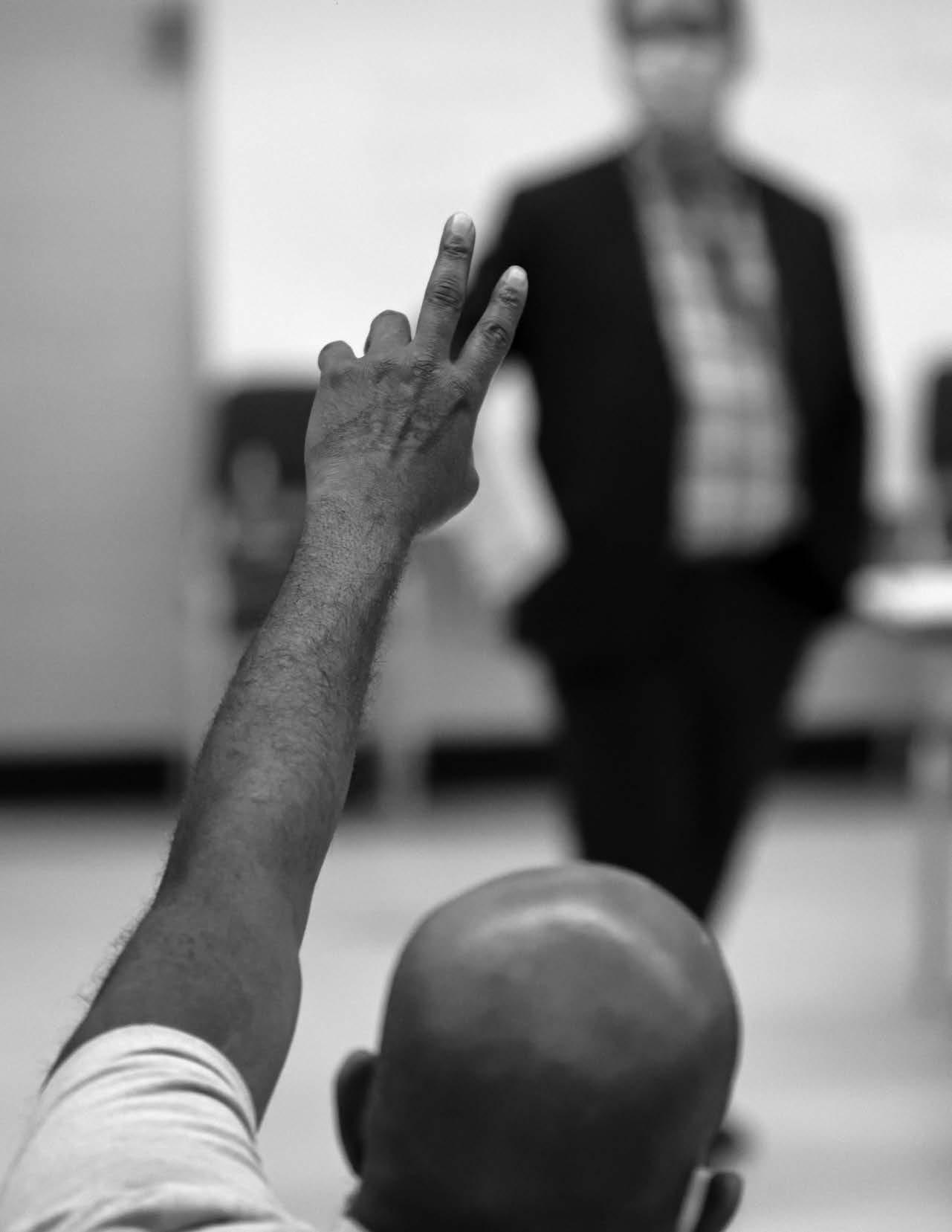2022 ANNUAL REPORT





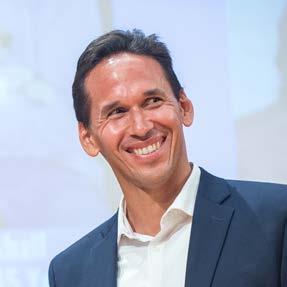
Visiting and teaching in prisons, I am constantly inspired and awed by the caliber of character, dignity, and intellect found in even the most dehumanizing environments. But walking into the Patuxent Institution in early 2022 was a special experience because I had an opportunity to meet the first cohort of students who will earn bachelor’s degrees from Georgetown University while incarcerated.
The launch of the Bachelor of Liberal Arts program at Patuxent was a momentous occasion for the Prisons and Justice Initiative and for incarcerated people in Maryland. And it was one of many milestones we celebrated at PJI in 2022.
In the past year, returning citizens graduated from the Pivot Program and the MORCA-Georgetown Paralegal Program, beginning exciting new careers and business ventures. Both programs welcomed new cohorts of students to the classroom this fall.
The Prison Scholars Program continued to bring credit-bearing Georgetown courses – as well as Main Campus undergraduates and guest lecturers – to the D.C. Jail. And Georgetown students traveled across the country to advocate for wrongfully convicted people as part of the unique Making an Exoneree course.
In the pages ahead, you’ll find details from across these programs and get to know some of the staff, students, and alumni who make them happen. Many thanks to everyone who has supported our work. We’re looking forward to another exciting year ahead in 2023.
Sincerely, Marc Howard

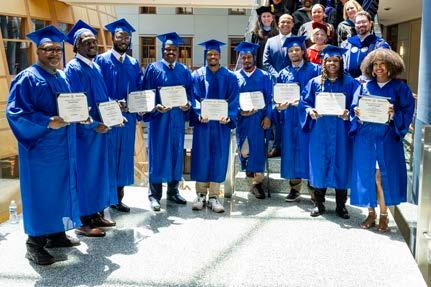
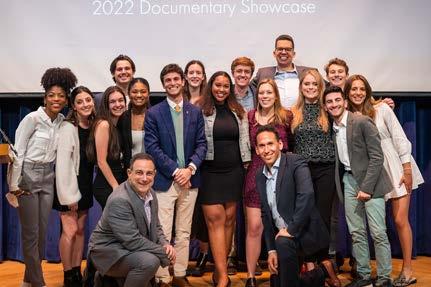
In prisons and on campus, the Georgetown Prisons and Justice Initiative empowers people affected by mass incarceration and contributes to the larger national movement for criminal legal reform.
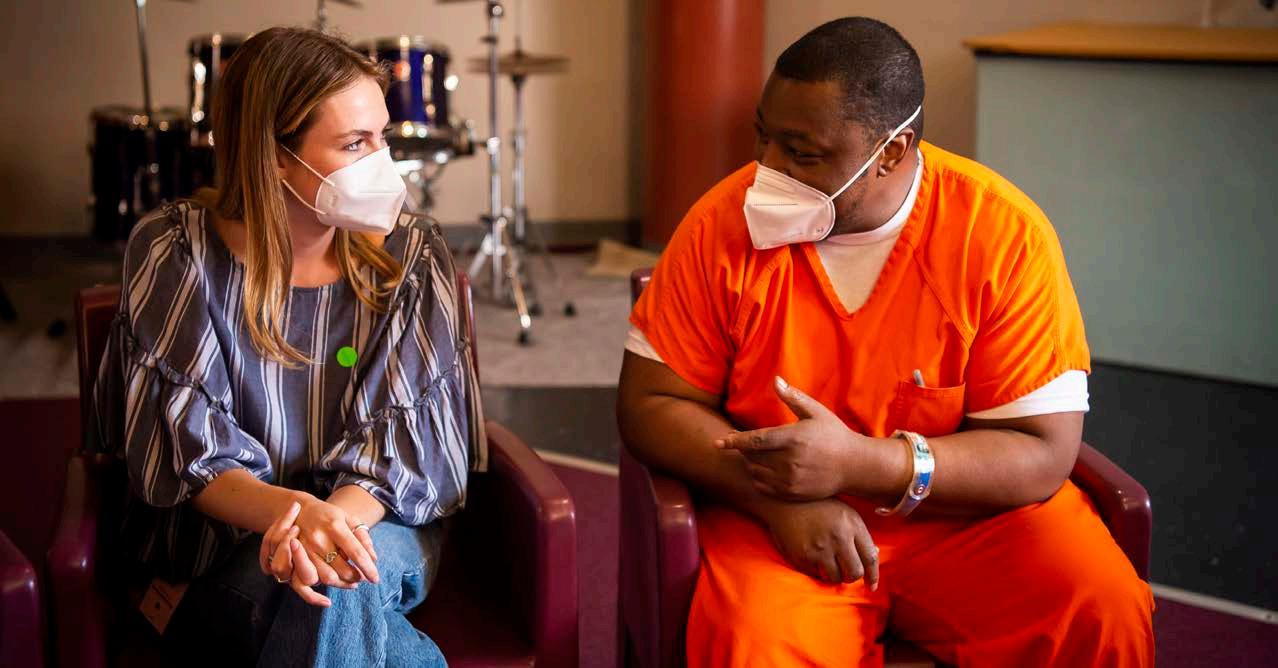
Our prison education and reentry programs create pathways for incarcerated people and returning citizens to reshape their futures and realize their potential as scholars, professionals, and entrepreneurs.
At the academic and policy levels, PJI hosts interdisciplinary dialogues and events that examine issues around mass incarceration from multiple perspectives and offer nonpartisan solutions for change.
In all of our work, we aim to understand and bring attention to the causes and consequences of mass incarceration while recognizing the humanity in everyone.
The Prisons and Justice Initiative offers our sincere thanks to the donors and supporters who have contributed to our mission. We also are deeply grateful for our partners in the Georgetown community and across D.C. and Maryland, including:
DC Department of Corrections
DC Department of Employment Services
Mayor’s Office on Returning Citizen Affairs Maryland Department of Public Safety and Correctional Services
Georgetown College of Arts & Sciences
Georgetown McDonough School of Business Georgetown School of Continuing Studies
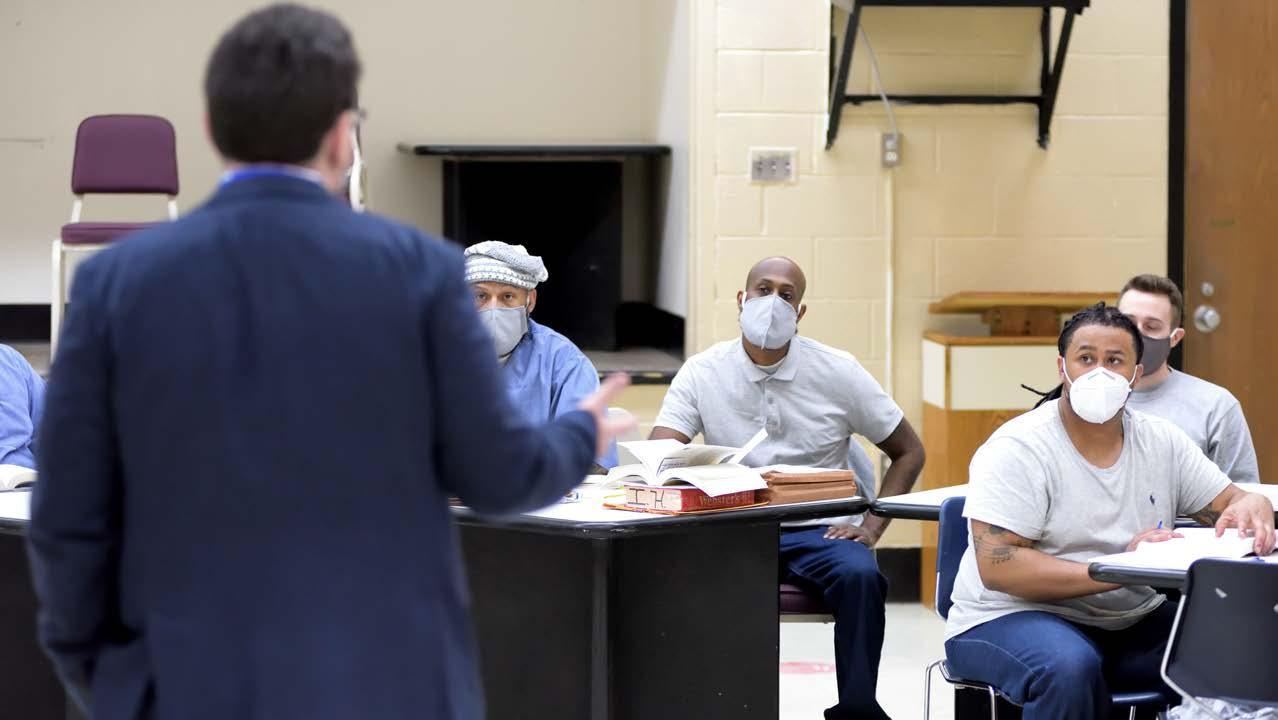
The Prisons and Justice Initiative began Georgetown’s first degree program for incarcerated students in January at the Patuxent Institution in Jessup, Md. The program creates a significant higher education opportunity for people incarcerated in Maryland and is expected to enroll 125 students over the next five years. Students work toward a Bachelor of Liberal Arts from the Georgetown College of Arts & Sciences, which will help prepare them for success in the future.

“This degree program is a model for how universities can bring transformative education opportunities into prison and support second chances,” said PJI Director Marc Howard.
A first class of 25 students kicked off the program in the spring 2022 semester, and another joined in the fall. The program broke barriers with its second cohort, the only mixed-gender, degree-granting program in the country.
The 120-credit interdisciplinary program is modeled after undergraduate degree offerings on Georgetown’s main campus with an emphasis on the liberal arts. After completing the degree’s core
“I think that this Georgetown program is going to take me further in life, take me to places I didn’t even think were possible for me. It’s giving me a chance to change my trajectory in life.”
-Rasheed Edwards, Student
requirements, students will choose from three majors – cultural humanities, interdisciplinary social science, and global intellectual history – and tailor their studies with electives. It will take most students about five years to complete the degree.
Each semester, students take two four-credit classes with Georgetown faculty and also have access to additional academic support and tutoring.
The program is funded by a $1 million grant from the Mellon Foundation, in addition to support from The Dune Road Foundation, Georgetown alumnus Damien Dwin, and the Department of Education’s Second Chance Pell program.
Adnan Syed, a student in the Bachelor of Liberal Arts program, came home from prison in September after serving 23 years for a crime he didn’t commit. Syed’s case, featured in the hit podcast “Serial,” captured the attention of millions.
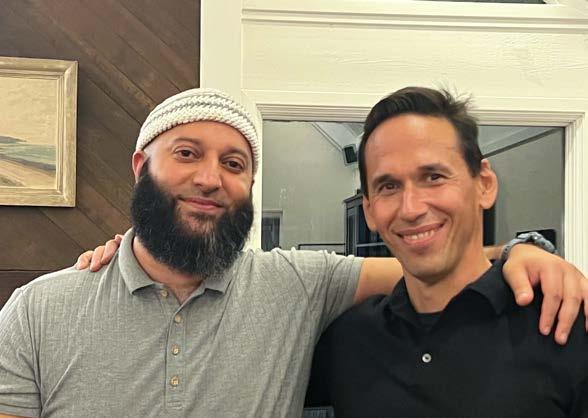
Syed was accepted into the program’s inaugural cohort and had been taking Georgetown classes since February. He walked out of a Baltimore courthouse with his Georgetown folder in hand on Sept. 19, and Maryland prosecutors later announced that they were dropping all charges against him.
Syed has said that he plans to continue his college education now that he’s free.
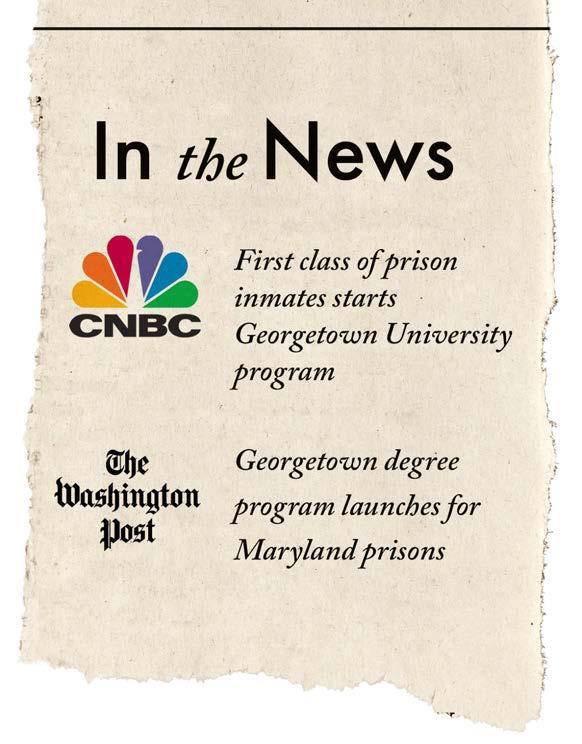
• Life Writing: Emily Hainze, Assistant Teaching Professor (Spring); Dennis Williams, Adjunct Lecturer of English (Fall)
• Writing and Culture Seminar: Emily Hainze, Assistant Teaching Professor, and Joseph Napolitano, Assistant Dean for Curricular Innovation (Summer)
• Writing for Public Audiences: Emily Hainze, Assistant Teaching Professor (Fall)
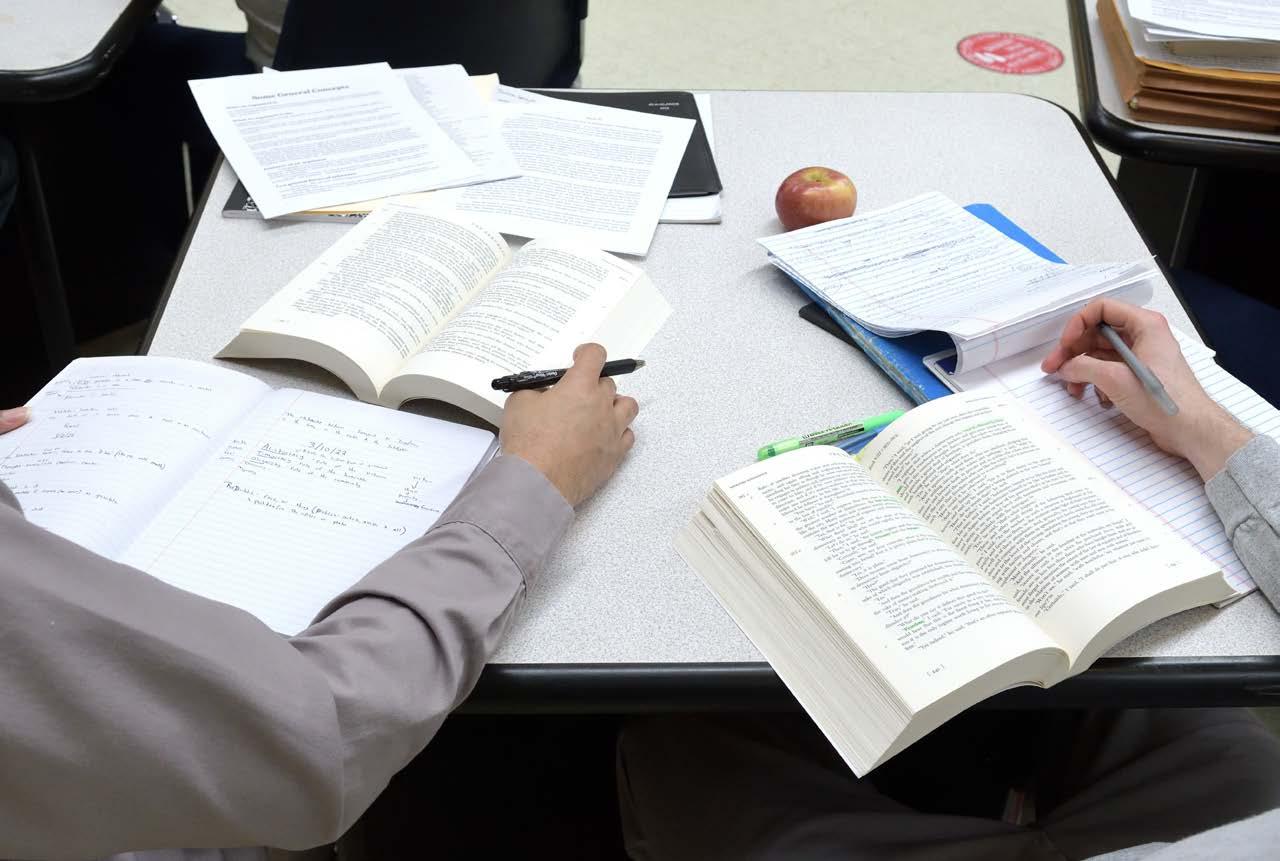
• Philosophy and Intellectual History: Joshua Miller, PJI Director of Education and Assistant Teaching Professor of Philosophy (Spring and Fall)
• Probability and Statistics: Nicole Meyer, Associate Teaching Professor of Math and Statistics (Summer)
• Problem of God: Mehmet Sayilgan, Assistant Teaching Professor of Theology and Religious Studies (Fall)
At the D.C. Jail, known fondly as Georgetown’s “Southeast Campus,” students take for-credit classes with Georgetown faculty, preparing for continued success in college and in the workforce.

The Prison Scholars Program has offered classes at the jail since 2018 and continued this year with a talented group of students and diverse credit-bearing and noncredit course offerings. After initially starting off the year with virtual classes via tablets due to COVID-19, the program returned to in-person instruction and a weekly guest lecture series. As in previous years, the fall and spring semester offered unique “insideoutside” classes, taught by PJI Director Marc Howard, through which Georgteown undergraduate students and Prison Scholars learn together and earn equal credit for their work.
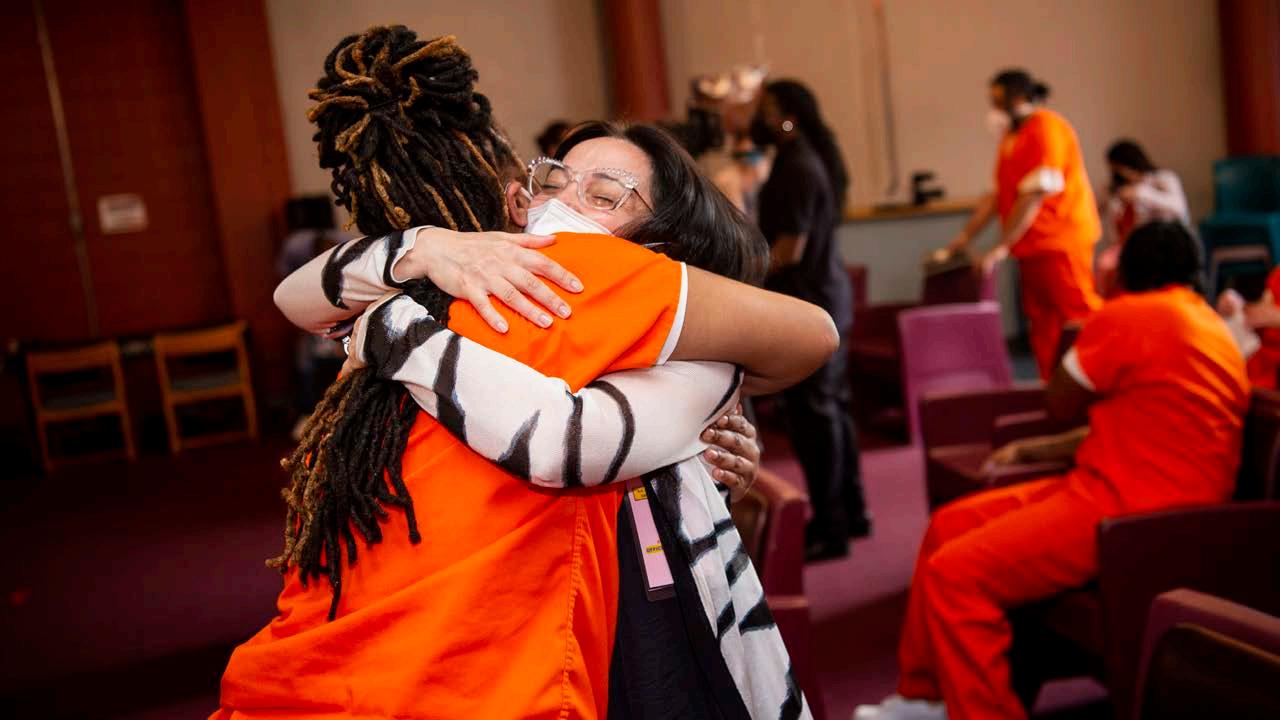
35 students earned a total of 696 credits in 2022
“I have to thank [the program] for allowing me to reach my potential and show my value. I am thankful for being a Georgetown Scholar, and I’m proud.”
-Gregory Barnhart-Moore, Student
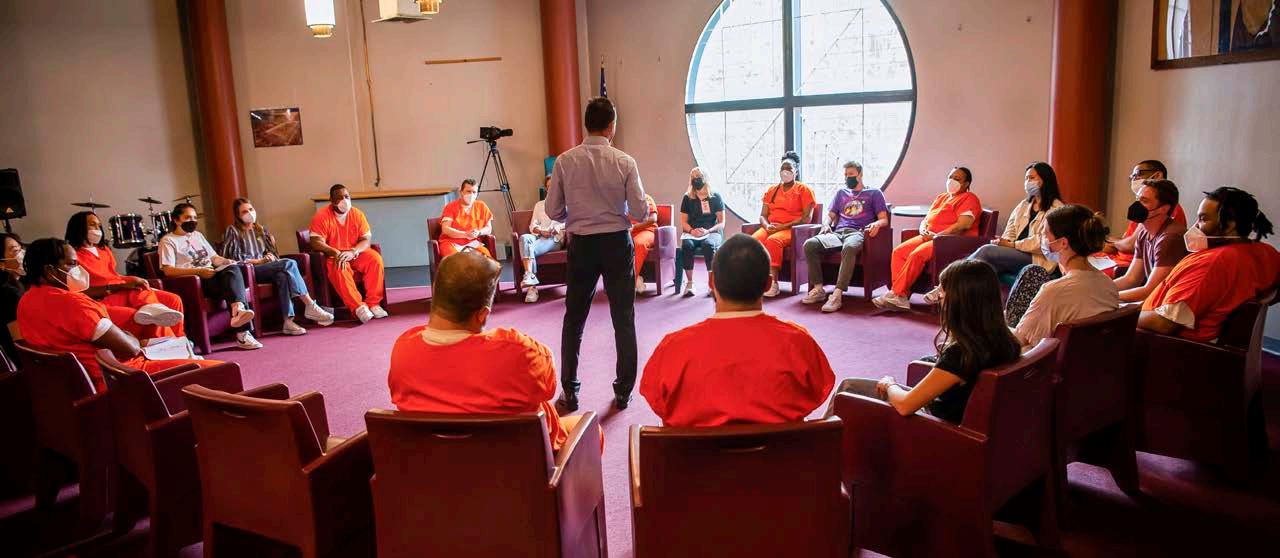
• Problem of God: Annalisa Butticci, Assistant Professor of Theology and Religious Studies
• Understanding Ourselves and Our World Through the Eyes of Biologists and Physicists: Heidi Elmendorf, Associate Professor of Biology, and Patrick Johnson, Associate Teaching Professor of Physics
• Forgotten Humanity of Prisoners: Marc Howard, PJI Director and Professor of Government and Law
• Introduction to Ethics: Judith Lichtenberg, Professor Emerita of Philosophy
• Introduction to Sociology: Bridget Brew, Adjunct Lecturer of Sociology
• Life Writing: Yael Kiken, Adjunct Lecturer of English
• Creative Writing: Bruce Clarke, Author and Former Criminal Defense Attorney*
• Principles of Microeconomics: Dylan DelliSanti, Adjunct Lecturer of Economics
• Prisons and Punishment: Marc Howard, PJI Director and Professor of Government and Law
• Methods of Social Research: Amanda Lewis, Adjunct Lecturer
• Writing and Culture: Sean Pears, Adjunct Lecturer of English
• Journalism and Politics: Neil Roland, AwardWinning Veteran Journalist*
• Personal Finance: Michael Ryan, Adjunct Professor of the Practice, Finance*
*non-credit
Syrian Human Rights Activist
Anthony Arend
Chair of the Department of Government and Professor of Government and Foreign Service
Nigel Boyle
Professor and Associate Dean, Pitzer College
Mary Cheh
District of Columbia Councilmember
Jon Cooper
Adjunct Professor of Sociology, George Washington University
Jordan Davis
Motivational Speaker, JD Speaks
Izuo-Ere “Mimi” Digifa Entrepreneur
Alexys Feaster
Founder and CEO, The Kinship Advisors
Karen Friedman
Director of Criminal Justice Innovation, Development, and Engagement, Bureau of Justice Assistance
Dan Gordon
Managing Director, GLD Partners LP
Emily Hainze
PJI Assistant Teaching Professor
Andrea Headley
Assistant Professor, McCourt School of Public Policy
Marc Howard
PJI Director and Professor of Government and Law
Arlando “Tray” Jones III
PJI Program Associate
James Jones
President and Director, The Reinvention Center
Yuki Kato
Assistant Professor of Sociology
Lance Kramer
Producer, Meridian Hill Pictures
Quill Kukla Professor of Philosophy
Matthew Kroenig
Professor of Government and Foreign Service
Amanda Lewis
Adjunct Lecturer
Huaping Lu-Adler
Associate Professor of Philosophy
Joshua Miller
PJI Director of Education and Assistant Professor of Philosophy
Elizabeth Oyer
Pardon Attorney, Department of Justice
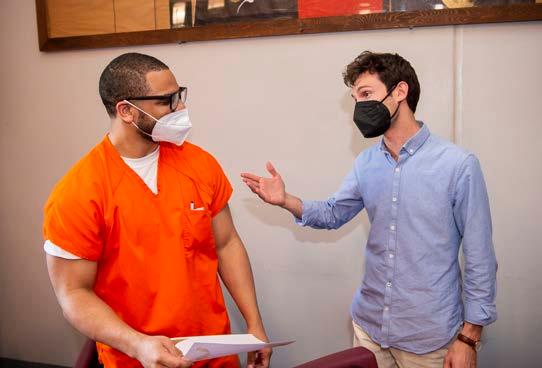
Reentry Program Director, Seattle Clemency Project and Executive Director, American Equity and Justice Group
Pietra Rivoli
Pivot Program Co-Founder and Professor, McDonough School of Business
Zandria Robinson
Associate Professor of African American Studies
Robert Sgarlata
Head Football Coach, Georgetown University
Olúfémi Táíwò
Assistant Professor of Philosophy
Marty
Peter P. Mullen Distinguished Visiting Professor
Janet Tran
Director of the Center for Civics, Education, and Opportunity, Ronald Reagan Presidential Foundation and Institute
Raymond Dodd is busy.
As a paralegal at the Washington Lawyers’ Committee, a published author, a notary, the founder of a nonprofit, and a social and economic justice mentor and advocate, Dodd’s days are packed from morning to night. And he is nowhere near slowing down.
Dodd, 47, grew up in Washington, D.C. and spent 25 years incarcerated for crimes he was convicted of as a juvenile. Throughout those years, he dreamed of one day advocating for those whose freedoms and civil rights are hindered by the U.S. criminal legal system.
After returning home in July 2020, he has been turning those dreams into a reality.
With the Washington Lawyers’ Committee, Dodd is working on equity issues including housing, education, employment, and disability discrimination, as well as criminal justice reform. The nonprofit he founded, Clusivity Justice Initiative, also addresses the barriers and injustices returning citizens often face when searching for housing and employment.
“What drives me is always wanting to do something new, helping someone and offering advice, hearing stories, and just trying to build,” Dodd said.
Dodd was working to improve his own circumstances and those of his community long before he was freed. In 2019, he began taking both non-credit and creditbearing Georgetown courses through PJI’s Prison Scholars Program at the D.C. Jail.
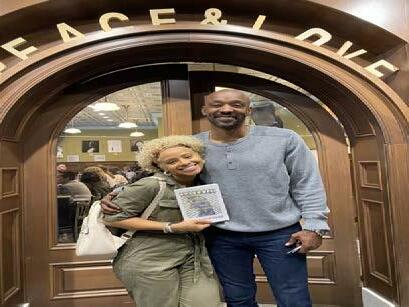
For Dodd, the Prison Scholars Program was an opportunity to learn from the experiences and perspectives of all of those coming together to pursue higher education.
“I really embraced the fact that the program opened my eyes to not only different perspectives, but also the fact that anything is possible,” he said.
When Kim Kardashian and producers were visiting the D.C. Jail to film “The Justice Project,” a documentary series about mass incarceration in the United States,
Dodd stood up to give a speech on the combined years he and his fellow classmates had spent incarcerated. The speech was included in the documentary, and the experience inspired Dodd to continue to elevate the voices of those personally affected by the criminal legal system.
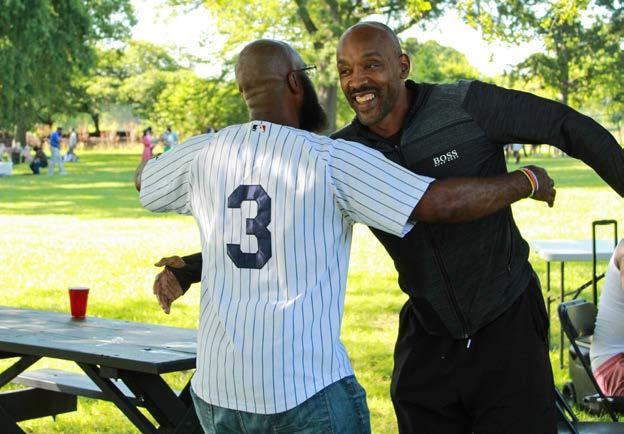
“You need to bring the affected people that are having lived experiences to the table to not only participate, but to also strategize and represent in leadership,” Dodd said.
To share his own experiences with the criminal legal system, Dodd published a book in November 2021 that he had started while still incarcerated. The book, titled Essays of My Journey Through Incarceration Into Philosophy, was inspired in part by lessons he gained in a philosophy class taught by Georgetown professor Judith Lichtenberg.
Ultimately, Dodd has learned to seize any opportunity he is presented with to keep moving forward and support his community.
“I didn’t expect to be or do some of the things that I’ve done,” Dodd said. “And when I got into the Georgetown program, and those opportunities presented themselves, I realized that if you act on opportunity, sometimes you get results that are beyond what your wildest imaginations may be.”

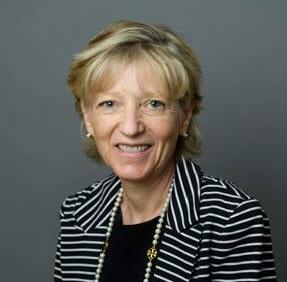
Even for the most resilient returning citizens, successful reentry is a challenge, and the journey has many twists and turns. But as the Pivot Program enters its fifth year, we are excited to see so many of our graduates thriving, progressing in their careers, and creating opportunities for others. Some have become integral members of our own team; many more have supported us in other ways – by helping us to recruit new Fellows, sharing their experiences with prospective employer partners, and in some cases, even becoming internship hosts themselves.
It is also gratifying to see second chance hiring beginning to become more prominent in the talent strategies of well-known companies like JPMorgan Chase, Slack, and CVS, among many others. While these inclusive hiring practices may not yet be the norm, we are confident that this shift in mindset will create opportunities for many returning citizens seeking to restart their lives and careers.
As always, we are very grateful to our community partners, our supporters, and the many members of the Georgetown University community – faculty, staff, and students – who have embraced our mission and contributed their time and expertise to us over these past few years. We look forward to championing another group of talented Pivot Fellows in the year ahead.
Sincerely,
Alyssa Lovegrove
Access to employment is one of the greatest barriers that returning citizens face and a cornerstone of a successful transition home. In partnership with the Georgetown McDonough School of Business, the Pivot Program offers returning citizens a specialized nine-month reentry program that combines higher education and professional opportunities to set graduates up for the future.
Pivot’s curriculum emphasizes business skills, entrepreneurial thinking, and leadership development, and Fellows gain onthe-job experience through three-month internships.
As a founding member of the Second Chance Business Coalition, the Pivot Program advances second chance hiring in the District and nationwide, working closely with employers to become more inclusive of people with criminal records.
The Pivot Program is supported by the DC Department of Employment Services, and students receive an hourly stipend during their coursework and internships.
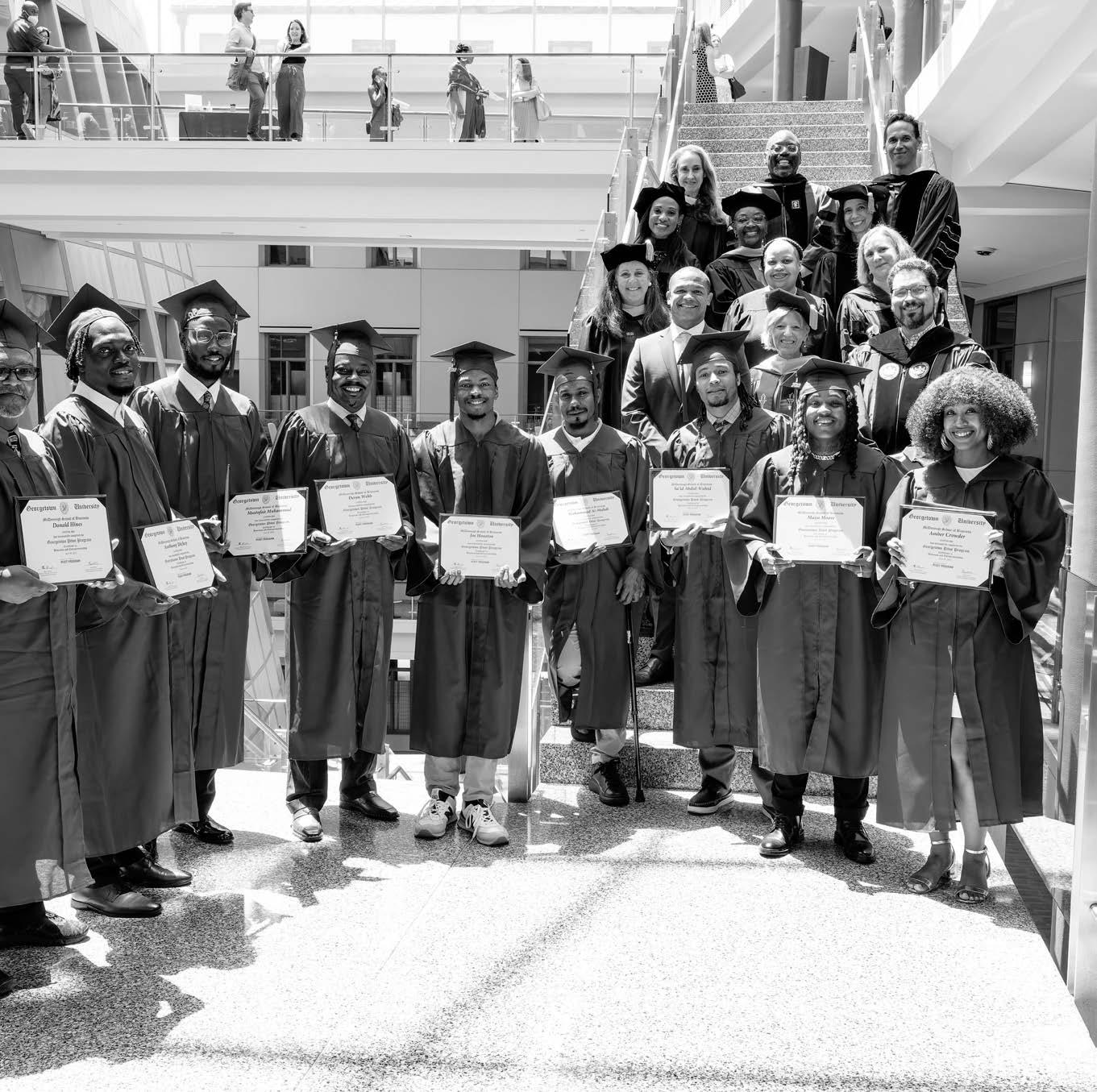
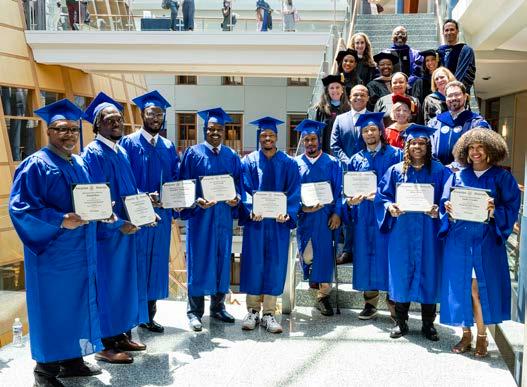
The Pivot Program celebrated the graduation of its fourth cohort of students on June 30 with a ceremony at the Rafik B. Hariri building on Georgetown’s Main Campus. Nine Pivot Fellows received their certificates in business and entrepreneurship after months of hard work in classes and internships.


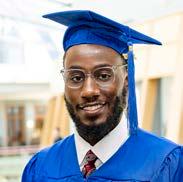
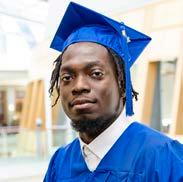

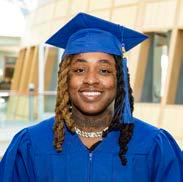
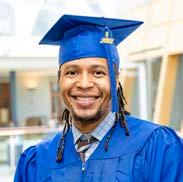



returning citizens have graduated from the Pivot Program
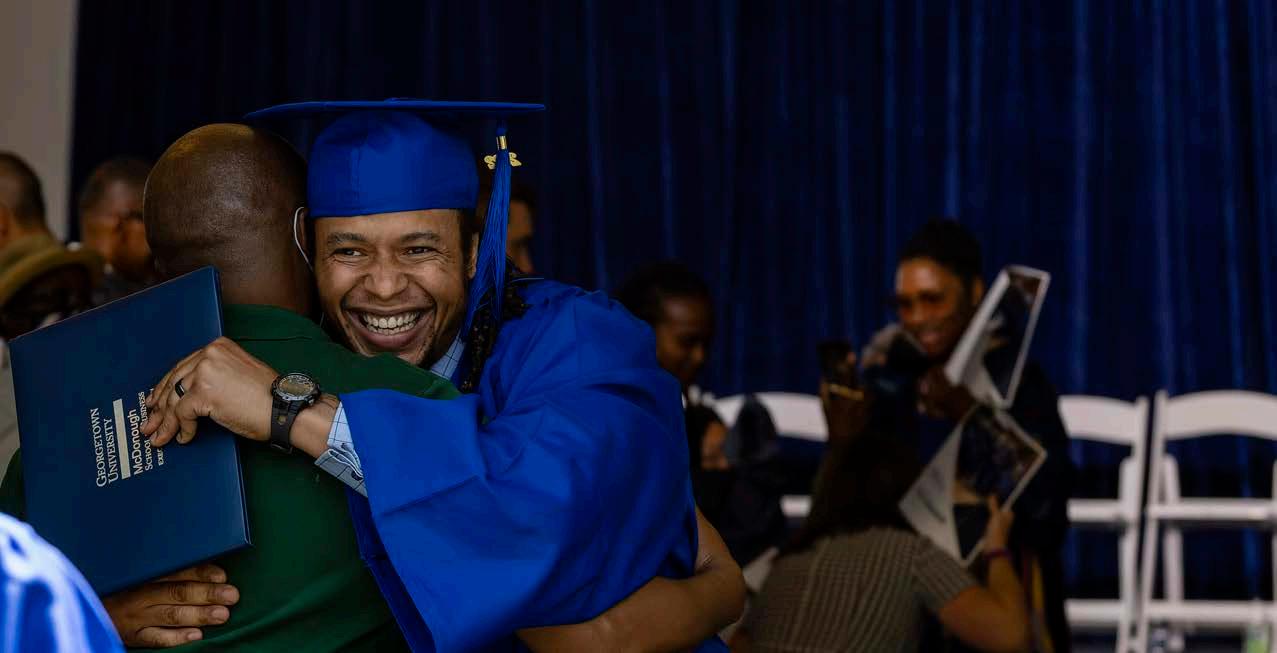
“Our 2022 graduates will join a distinguished community of alumni who have shown the world that no one’s past should dictate their future and that our economy and communities will thrive when access to opportunity is extended to all.”
Dean,
After completing their academic coursework, Pivot Fellows finish the program with three-month internships, where they can apply what they’ve learned in the classroom and continue to grow as professionals. The close partnerships the program has with intern hosts and employer partners are part of what sets it apart from other reentry programs.
Internships also lay the groundwork for permanent employment and open a door for continued second chance hiring.
Penn Social owner Geoff Dawson, this year’s Pivot Partner of the Year, said returning citizens are the “single greatest opportunity for businesses in this country.”
“It has been an incredible honor to work with the Pivot Program,” Dawson said. “I am working with such joyful, interesting, wonderful people. I hope that I can then return that joy to the participants in the program, and I look forward to doing that for many years.”
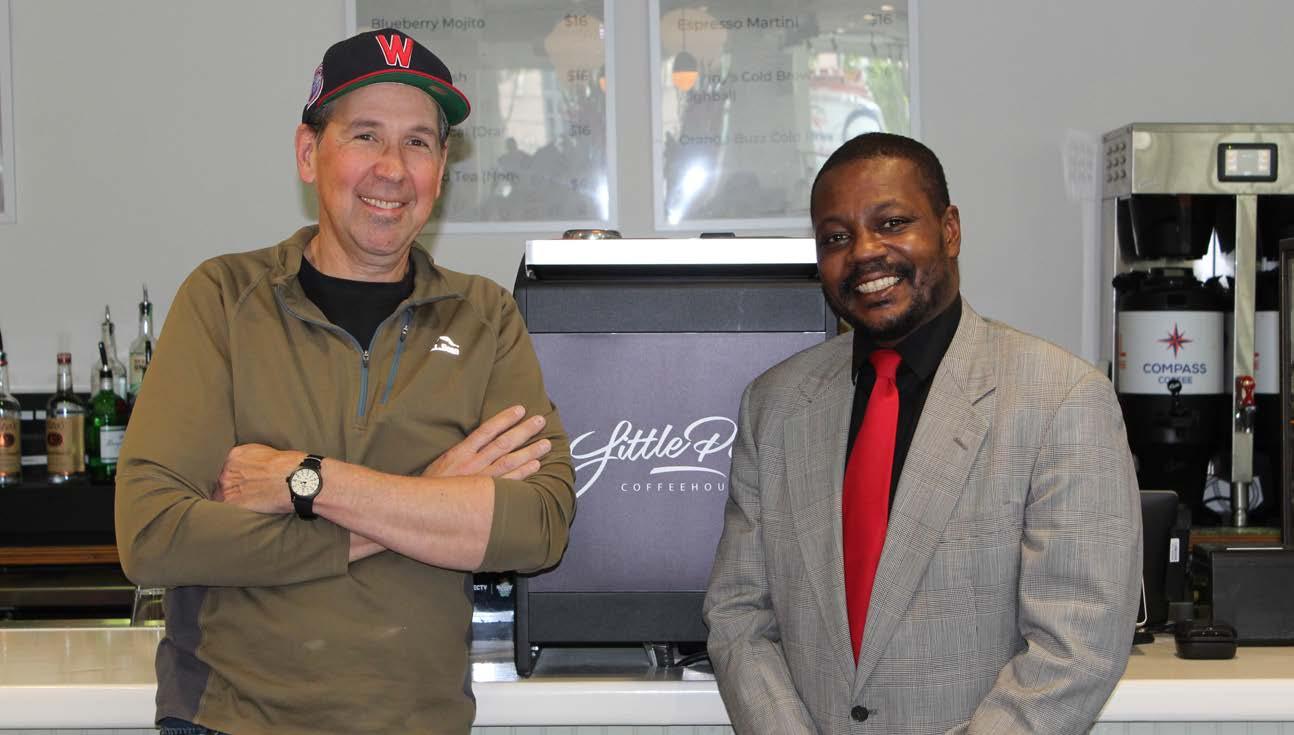
The annual Pitch Competition is the culmination of Pivot’s entrepreneurship curriculum, providing Fellows with an opportunity to showcase the skills learned throughout their time with the program.
“Entrepreneurship has always been a core component of the Pivot curriculum,” Pivot Executive Director Alyssa Lovegrove said. “And that’s because it allows the Fellows to learn the fundamentals of business but also because it inspires them and enables them to become opportunity spotters and to see how they can create a pathway for themselves and for others.”
At this year’s Pitch Competition in June, eight Pivot Fellows competed at the virtual event, walking a panel of distinguished judges through their ideas, plans, and budgets for a wide array of startups. They took home a total of $15,000 in startup funding and expert advice from successful entrepreneurs.
Amber Crowder won first place for her inclusive bar and gathering space for queer people of color, called Bloom. Using the funding she won from the Pitch Competition, she is now bringing her idea to fruition and is slated to launch her business by the end of 2022.
“Ten to 12 years ago, you started to see a lot of spaces closing because gentrification caused rent to go up. Within the queer community, there really hasn’t been anywhere specifically for Black women to go,” Crowder said. “This space is going to be a safe space for more people. That’s what’s exciting for me.”
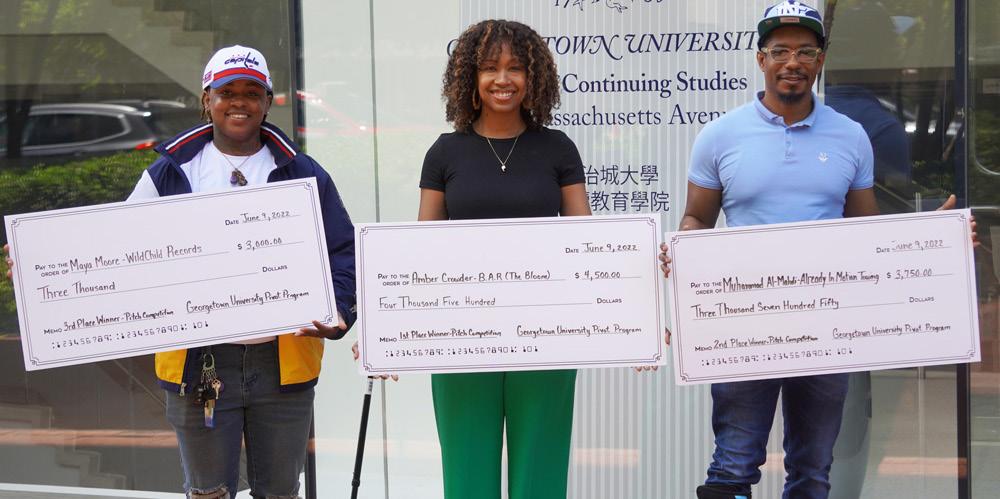
The Pivot Program kicked off its fifth year on Oct. 11, bringing its largest cohort in the history of the program and welcoming a new group of students excited to take the next steps in their careers.
The students’ paths to the program vary — some were urged to apply by Pivot graduates, some were referred through other reentry organizations, and some found out about Pivot while still incarcerated.
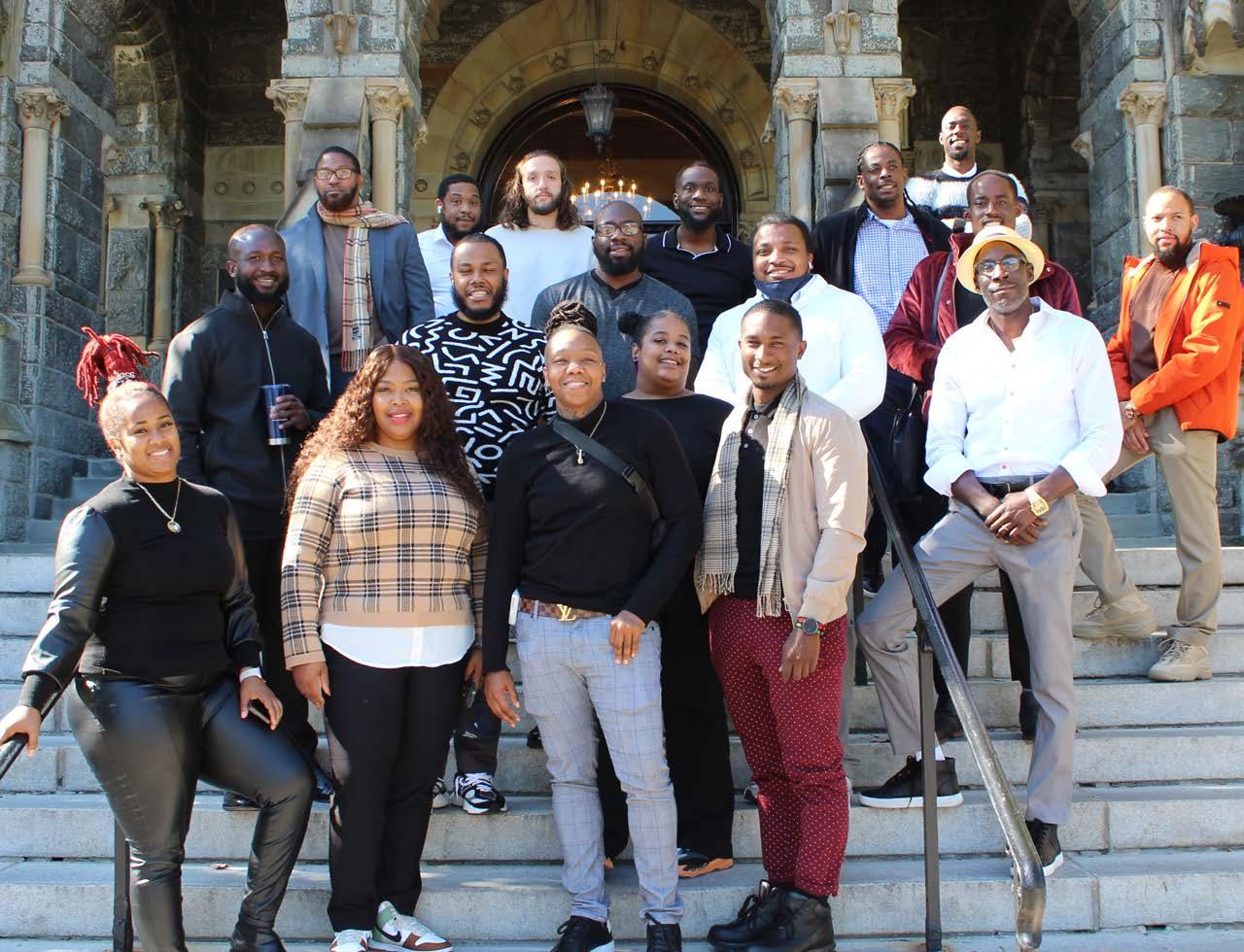
“Last year, I was in prison. Now I’m talking to you in a Georgetown facility. It does something to your confidence,” Pivot Fellow Raashed Hall said on the
first day of classes.
Pivot Fellow Tyronda Ferrell said she couldn’t pass up the opportunity to get a Georgetown education in business and entrepreneurship.
“They’ll teach me how to become a better speaker, how to grasp the concept of how to have a business, how to network, and educate me more on the outline of creating this business,” she said. “Sign me up!”
The current class of students will begin their internships in the spring of 2023 and graduate in June.
George Comer
Associate Professor and Co-Academic Director, Reach Program and Director of Underrepresented Minority Student Support
Joy Comer
Guest Lecturer, Georgetown Pivot Program
Shye Gilad
Professor of the Practice in Management, McDonough School of Business
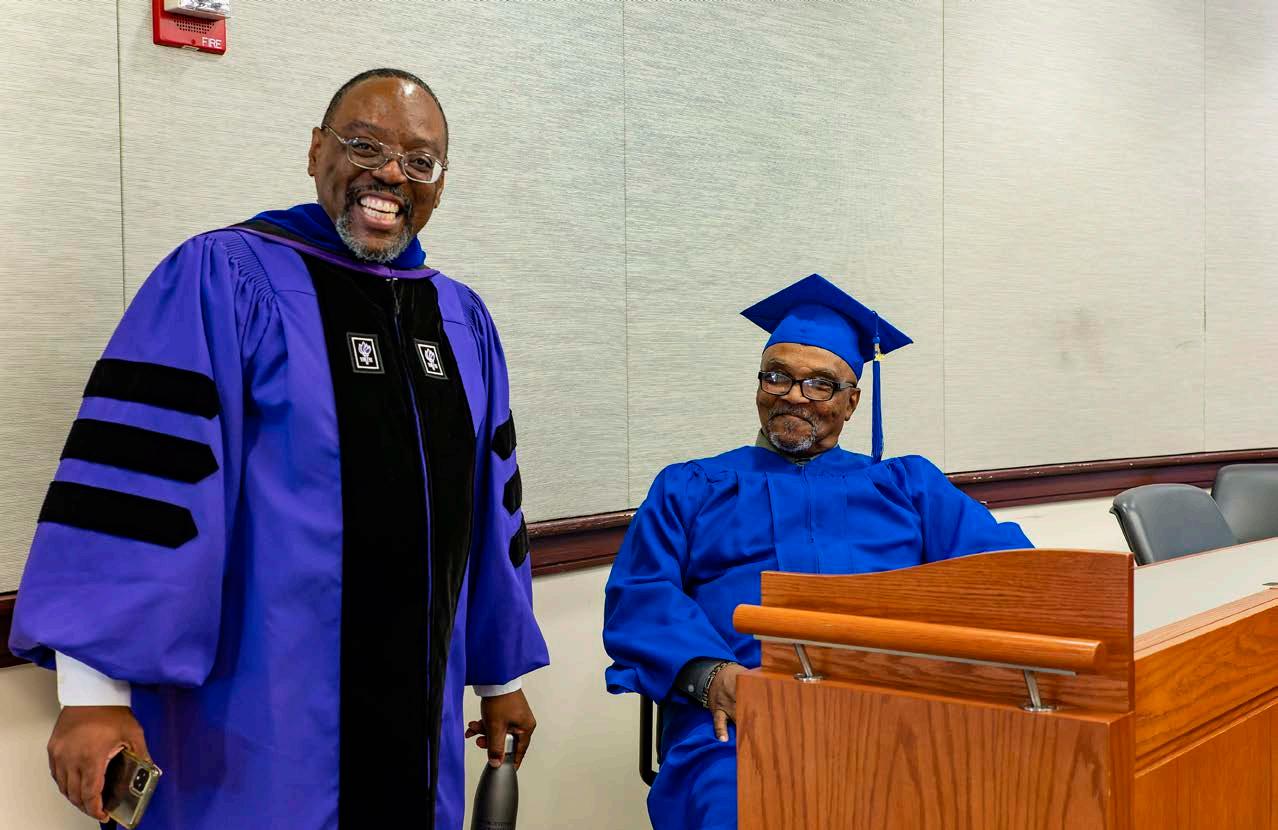
Pivot Program Executive Director, Teaching Professor, McDonough School of Business and Senior Advisor, Georgetown Entrepreneurship Initiative
PJI Director of Education and Assistant Teaching Professor of Philosophy
Chief Financial and Administrative Officer, McDonough School of Business
Professor of Communication, Culture, and Technology, and Affiliate Professor, McDonough School of Business
Adjunct Faculty, Georgetown School of Continuing Studies, Corporate and Custom Education
Teaching Professor, McDonough School of Business
Two years have passed since Monte Pollard graduated from the Pivot Program, and he is already supporting other returning citizens as the head of a D.C. reentry organization. Not only is he leading nonprofit Changing Perceptions, he is also pursuing a second culinary degree and earned a certificate in nonprofit management from Georgetown’s McCourt School of Public Policy. In all of the projects he has taken on, Pollard is unstoppable.
Shortly after graduating from Pivot in 2020, Pollard joined Changing Perceptions, and he was named its executive director a little more than a year later. Pollard said his own experience in the criminal legal system, plus the entrepreneurship and creative thinking experience he gained in Pivot, prepared him for the leadership role.
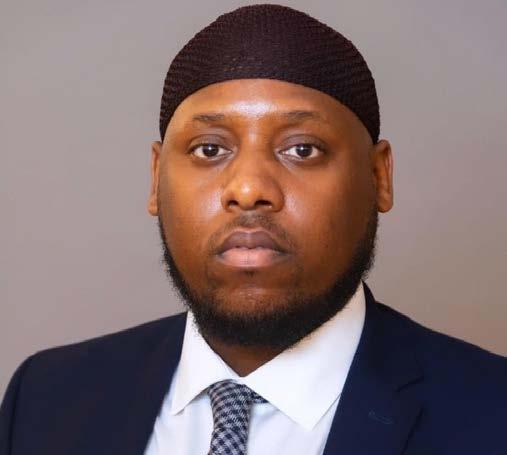
“I’d like to be that person to find a solution to the problems that I see within the community,” Pollard said. “I learned so much from Pivot on how to run and manage a business, so I was comfortable coming into this role as executive director.”
Changing Perceptions assists returning citizens with social services like housing and employment, and with a recent government grant, its reach is only expanding. “Starting from quarter one, we had about 10 participants. Now we’re here in quarter four, and we have over 50,” Pollard said. “I was overwhelmed with joy.”
Just as he’s chased after his own goals, Pollard sees no limit to Changing Perceptions’ potential to serve returning citizens. The organization has focused exclusively on returning citizens released under D.C.’s Incarceration Reduction Amendment Act and the subsequent Second Look Amendment Act. Pollard hopes to open Changing Perceptions to all returning citizens, as well as expand its services to Maryland and Virginia. He also envisions starting a “Sandbox
Program” within Changing Perceptions aimed at providing family and friends of returning citizens with resources to support their loved ones.
Outside of Changing Perceptions, Pollard has continued to pursue his passion for food and the entrepreneurship goals he fostered in the Pivot Program. After graduating from the Auguste Escoffier School of Culinary Arts this November, Pollard plans to open his own catering business.
Reflecting on his reentry journey and career over the past few years, Pollard said he’s grateful for where he is today and for the support he’s received along the way.
“It’s been really rewarding… It just seems like a dream come true,” he said. “It takes a village, and I have that village. Pivot is my village.”
“Pivot is my village.”
PJI reentry programs recognize the importance of supporting formerly incarcerated people in finding careers – not just jobs.
The MORCA-Georgetown Paralegal Program prepares returning citizens to enter the field of law and connects them with full-time employment after graduation. Through an intensive 20-week program, students earn a certificate in paralegal studies from the Georgetown School of Continuing Studies and receive an hourly stipend while completing their classes. They then go on to interview with law firms, government
agencies, and other employers to secure positions as professional paralegals.
For employer partners, the program is an opportunity to bring talented, driven, and qualified paralegals onto their staff and break down barriers in the professional legal field that exclude people with criminal records.
The program is supported by the DC Department of Employment Services and the Mayor’s Office on Returning Citizen Affairs.
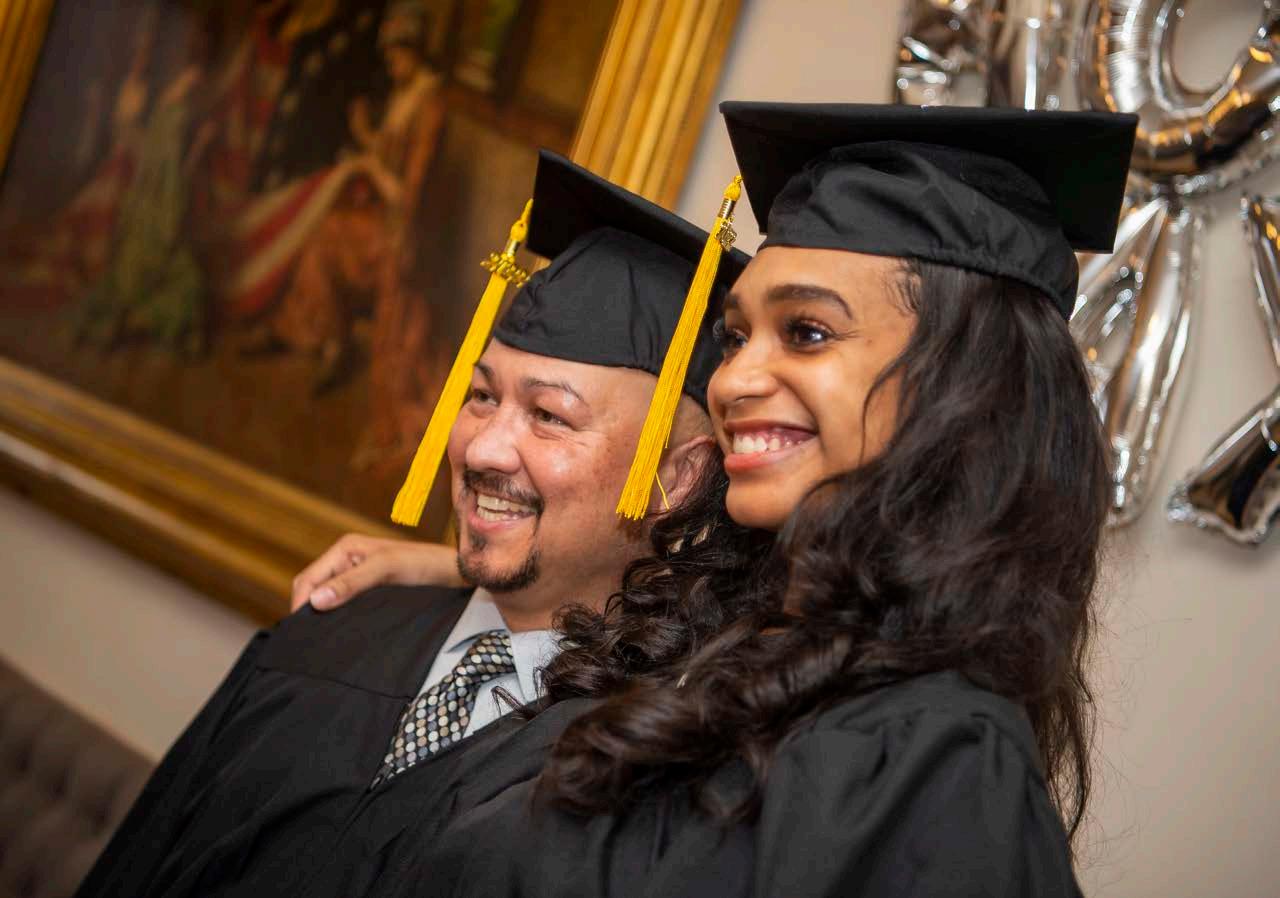
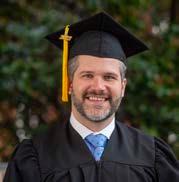
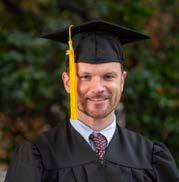
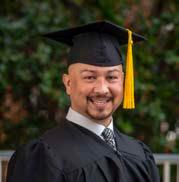
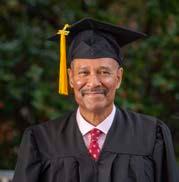
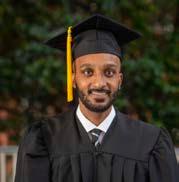
Ten returning citizens celebrated their graduation from the MORCA-Georgetown Paralegal Program with family and friends at a ceremony on Feb. 4.
“You stood out as a person who is ready to take what you learned here, combine it with your own life experiences, and launch a successful legal career,” Mayor Muriel Bowser told the graduates in a video message. “In doing so, you’re not only giving yourself a fair shot, but you’ll help other Washingtonians get the fair shot and second chance they deserve.”
Addressing her fellow graduates and the friends and family who gathered to celebrate their accomplishment, Brianna Stutson recalled how she often felt discouraged as she struggled to find opportunities for work, education, or professional training after she returned home from incarceration.

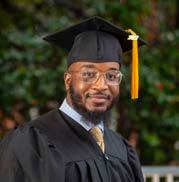
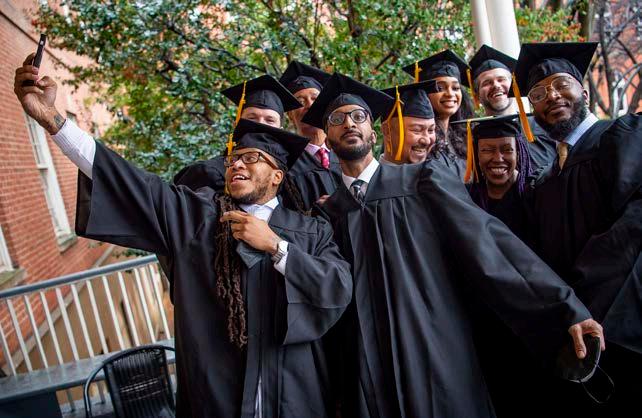
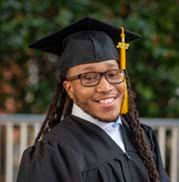
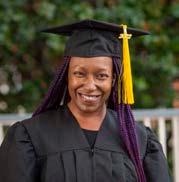
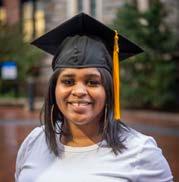
“I knew I was intelligent. I knew I had valuable skills that could take me places. But bearing the title of felon and young mother of two was a challenge. As much as I tried to work around it, it was as if my past was controlling my future,” she said.
Applying for the paralegal program – as she learned she would become a mother of three – was one of the best decisions she’s ever made, Stutson said. Now, she is working as a paralegal at law firm Kirkland & Ellis.
“My experience at Georgetown was challenging, rigorous, demanding, and most of all, it was rewarding,” she said. “No matter what obstacles stand in your way, no matter what challenges, you can do it.”
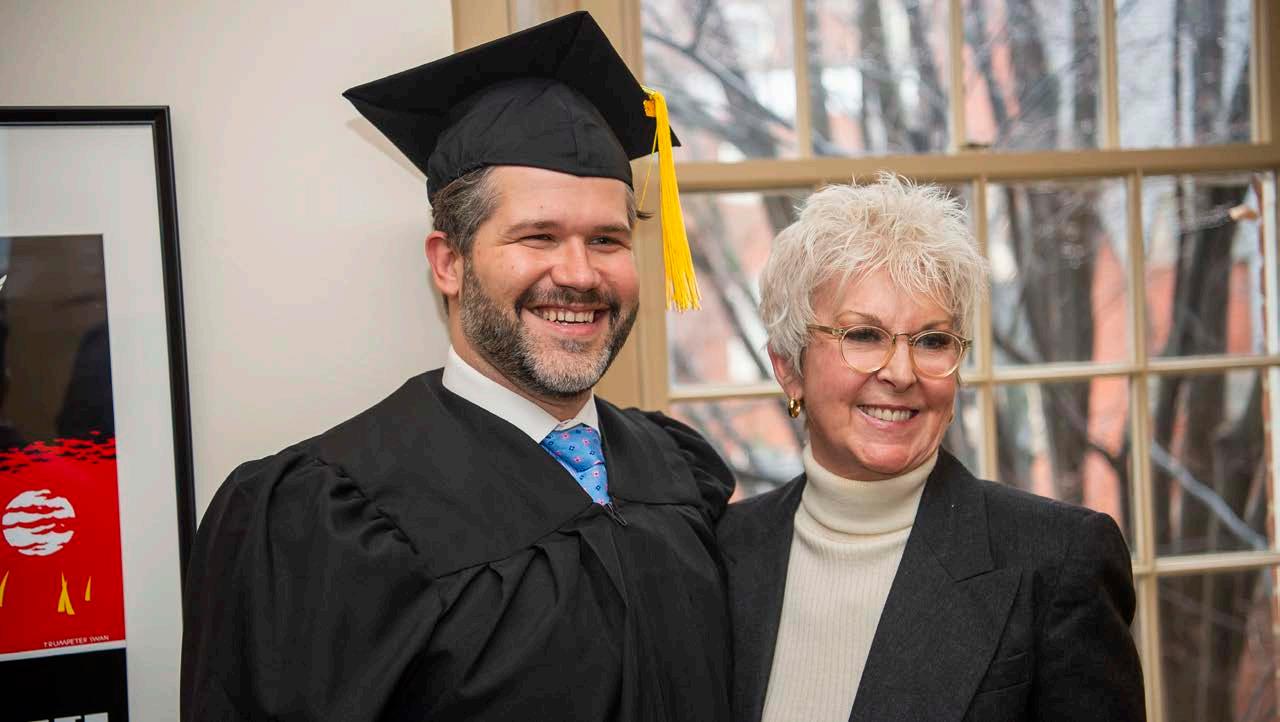
Suzanne Tsintolas
Faculty Director
Rawle Andrews
PJI is proud to partner with top law firms, nonprofit organizations, and government agencies to place graduates and set them up for success in the workplace. Partners play a key role in advancing second chance hiring in D.C. and open doors for rising professionals. Thank you to this year’s Paralegal Program employment partners:
In July, PJI welcomed a new class of MORCA-Georgetown Paralegal Fellows to campus to begin their studies. The students in the program’s third cohort are expected to graduate in December and begin careers in the legal field.
Paralegal Fellow Ronald Toms served 25 years in prison before President Obama commuted his life sentence and he came home in 2018. During his incarceration, he studied the law extensively, filing motions in his own case and on others’ behalf. The paralegal program was an opportunity to build on that background and work toward a long-term career.
“The experience has been more than I expected. It’s a blessing,” Toms said. “This program is the best thing that could have happened to me at this moment. It’s helping me not just inside the classroom but outside as well.”
Toms noted that classes aren’t easy, even for someone familiar with legal research. But the program provides motivation and structure that can be a lifeline for someone navigating their reentry.
“It’s rough for returning citizens, but these types of programs keep people from going back to prison,” he said.
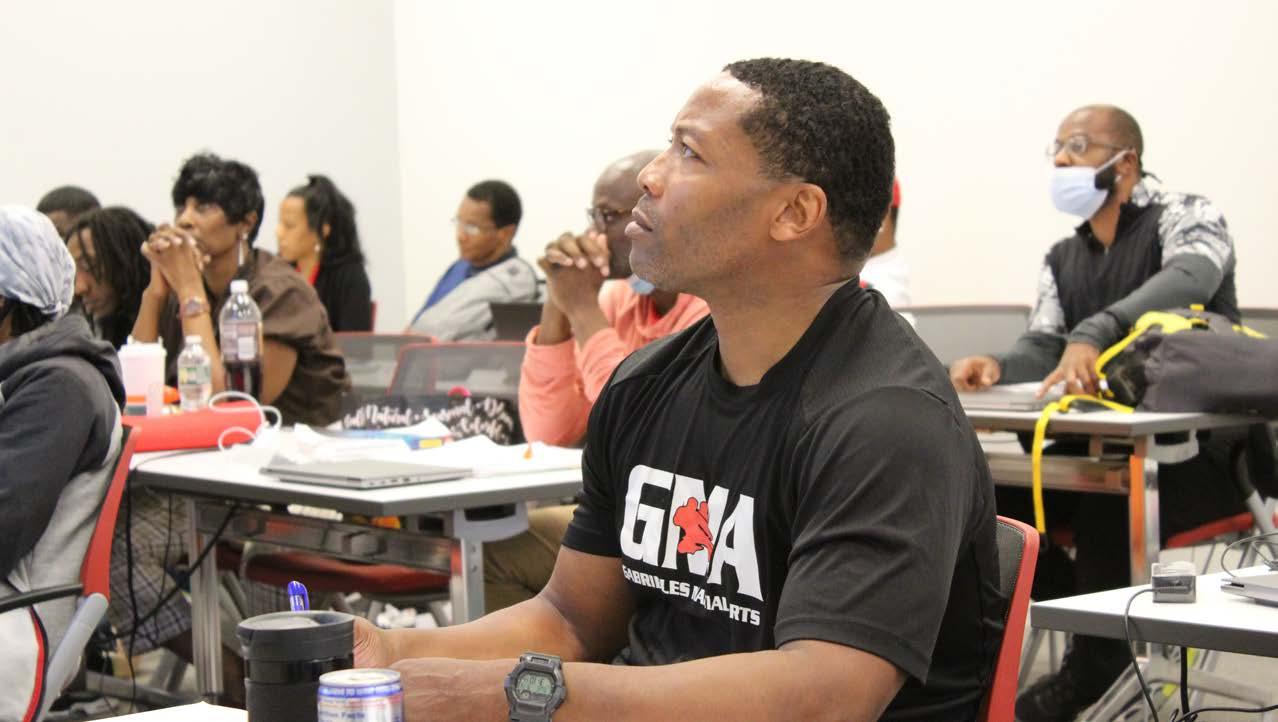
Guy Redford admits he got off to a rocky start when he first arrived at the MORCA-Georgetown Paralegal Program in the fall of 2021, and he even considered leaving early on. But less than a year later, he has a full-time job as a paralegal and is back in the classroom encouraging the next group of students.
“When I came into the program, I felt way in over my head and overwhelmed with all of the information that was coming at me. I wasn’t even sure that I was going to succeed,” Redford recalled. “So where I’m at today is a complete turnaround.”
Redford graduated from the program’s second cohort at the top of the class and was offered a full-time paralegal job in the D.C. Attorney General’s Office in early 2022. In his role, he focuses on electronic discovery and document review, helping attorneys stay prepared and organized for their cases.
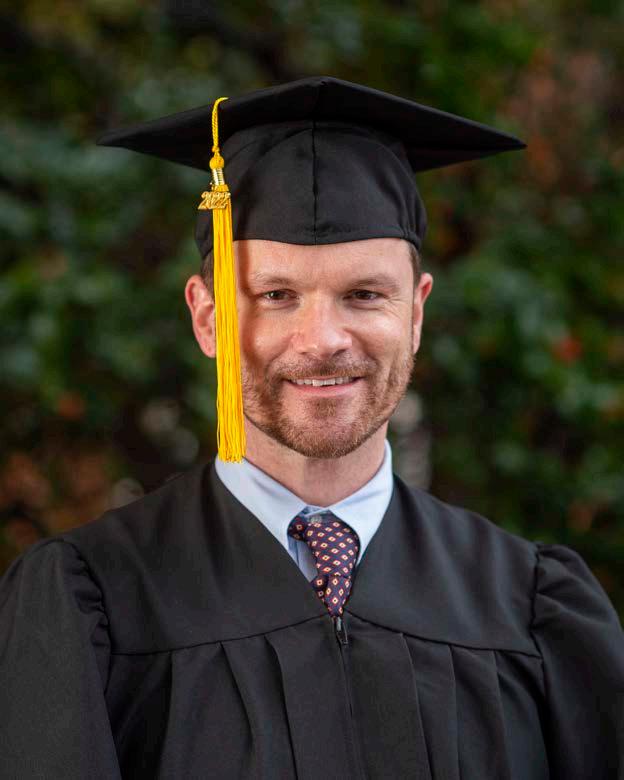
Redford said it’s ironic that he landed a tech-focused job after initially finding that aspect of the paralegal program’s curriculum so daunting.
“When I found out my position was going to be in technology, I was nervous. But then I thought about all of the things I had gone through and accomplished in the program, and I felt excited to tackle something that had given me so much anxiety,” Redford said. “And when I started, I couldn’t believe it – I knew exactly what to do.”
In addition to the technical and paralegal skills, Redford’s main takeaway from the program was a major boost in confidence.
“The confidence alone that this program has given me is life changing,” he said. “I never thought that I would have an opportunity to be working for the government after my past. So it’s just an amazing feeling.”
Redford said he’s proud that his daughter has been able to see his confidence and career grow and hopes he can continue to pass on the lessons he’s learned through the program to her. And back at Georgetown, Redford has also served as a role model for the next cohort of MORCA-Georgetown Paralegal Fellows. A few hours each week, he and several other alumni offered guidance and mentorship to the students as they worked through the challenging program.
“There was a time where I felt like I should drop out, and somebody helped lift me up and guide me to make me feel that I could do it,” Redford said. “I want to be a part of that for somebody else.”
Redford was recently accepted into the DC Futures Program, which supports college students in the District with scholarships and coaching. He plans to continue his education and pursue a bachelor’s degree in IT at Catholic University next year.
Fifteen Georgetown undergraduate students in the 2022 Making an Exoneree course reexamined five wrongful conviction cases, giving new energy to the efforts to correct injustice and free innocent people from prison.
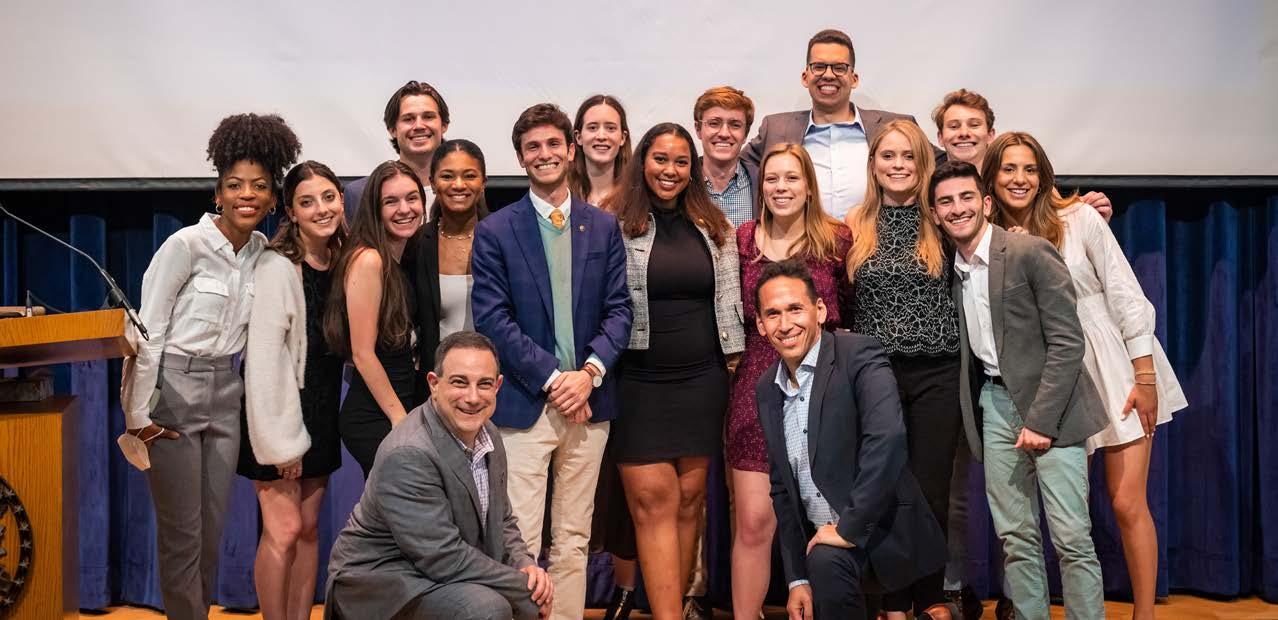
Billie Allen
Sentence: Death Penalty Time Served: 25 Years
Shanda Crain
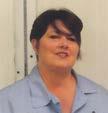
Sentence: Life Without Parole Time Served: 27 Years




Omar Hooks Sentence: Life in Prison Time Served: 22 Years
Faarooq Mansour
Sentence: Life Without Parole Time Served: 20 Years
Tim Young Sentence: Death Penalty Time Served: 23 Years Visit makinganexoneree.com to learn more about these cases and how you can help.
Each year, students in the Georgetown College of Arts & Sciences course spend the semester poring through case files, conducting interviews, and delving into wrongful conviction cases. For the first time, this year’s class teamed up with Film and Digital Media students from the University of California Santa Cruz. Together, the Georgetown and UCSC students created short documentaries, online petitions, and social media campaigns to advocate for the freedom of their “clients.” As in past years, their work has continued well after the formal end of the semester, as the groups form long-lasting bonds.
This year, a group of alumni from the class’s 2021 cohort celebrated a long-awaited reunion when Arlando “Tray” Jones III was released from a Maryland prison in July after serving 37 years for a
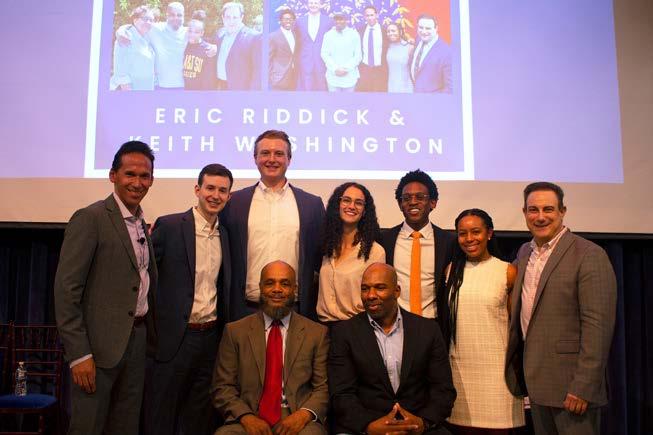
crime he didn’t commit. Jones is now the fourth person featured in Making an Exoneree to be released, following Eric Riddick and Keith Washington in 2021 and Valentino Dixon in 2018. Shortly after his release, Jones joined the PJI team as a Program Associate.
PJI and the Making an Exoneree team were thrilled to welcome two of the course’s success stories to campus for an event organized by the Georgetown Lecture Fund.
Eric Riddick and Keith Washington, who were released from prison in May and June 2021, respectively, shared their experiences with the Georgetown community on April 6, 2022. Joining them were Marc Howard and Marty Tankleff, who co-teach the course, along with the Georgetown students who advocated for their freedom. Riddick spent 29 years in prison before he was exonerated. Washington served 13 years.
“I look at [the students] like my brothers and sister,” Riddick said. “Their advocacy and them fighting for my freedom is testimony that the power is truly with the people.”
“Your research, investigation, and advocacy have not only reinvigorated me, but it has brought me one step closer to freedom.”
-Tim Young
A new $495,000 grant from the Department of Justice will allow the Making an Exoneree program to ramp up its support of wrongfully convicted people across the country.
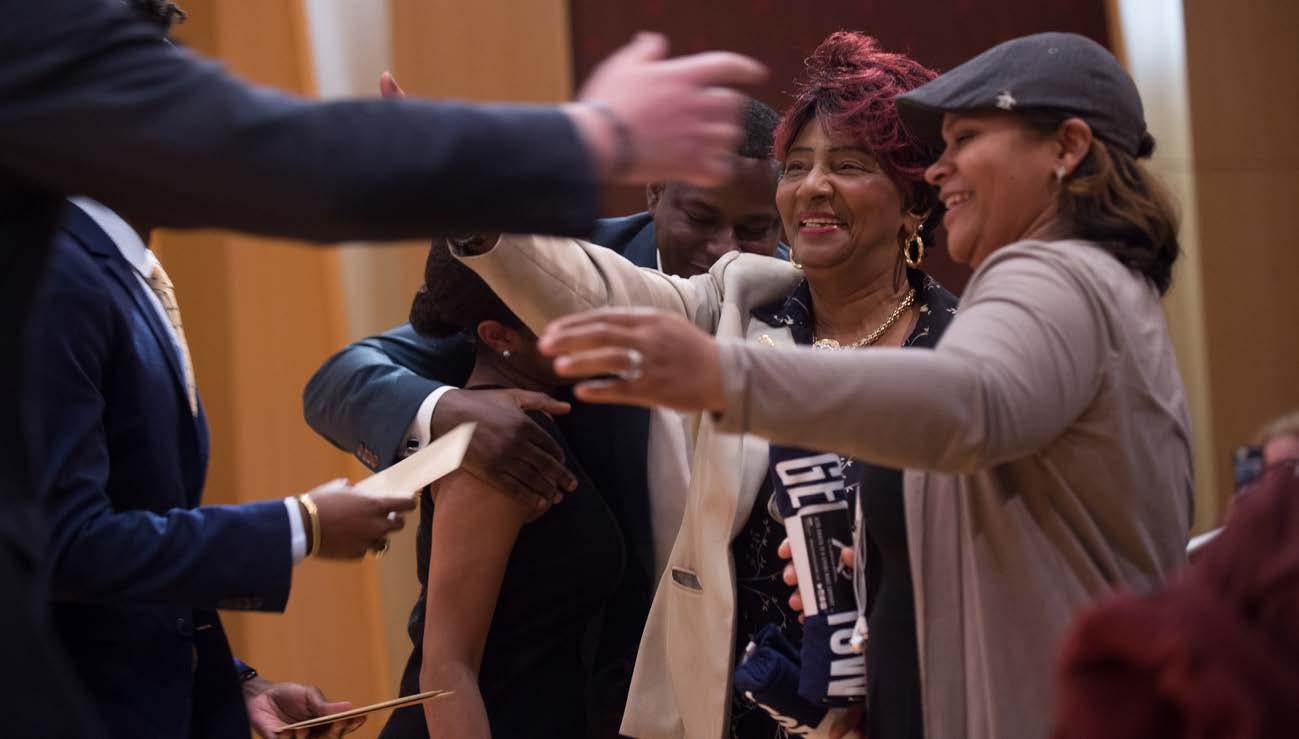
The two-year grant funding from the Bureau of Justice Assistance, awarded on Oct. 1., aims to strengthen programs that support people claiming innocence post-conviction and to help prevent future wrongful convictions.
With the grant award, Making an Exoneree will be able to significantly bolster its wrongful conviction work, bring on new staff, conduct research and analysis, fund student travel, and expand its collaboration with outside experts and attorneys.
“Over the past five years, Making an Exoneree has proven that a small group of dedicated undergraduate students can make a big difference in the life of a wrongfully convicted person,” said PJI Director Marc Howard. “With this grant from the Department of Justice, the program will be able to solidify and expand on this important work to bring innocent people home from prison.”
This project was supported by Grant No. 15PBJA-22-GG-03927-WRNG awarded by the Bureau of Justice Assistance. The Bureau of Justice Assistance is a component of the Department of Justice’s Office of Justice Programs, which also includes the Bureau of Justice Statistics, the National Institute of Justice, the Office of Juvenile Justice and Delinquency Prevention, the Office for Victims of Crime, and the SMART Office. Points of view or opinions in this document are those of the author and do not necessarily represent the official position or policies of the U.S. Department of Justice.
Georgetown honored Making an Exoneree’s Marty Tankleff with the Peter P. Mullen Distinguished Visiting Professorship in the Government Department in recognition of his contributions to the university and the field of law.
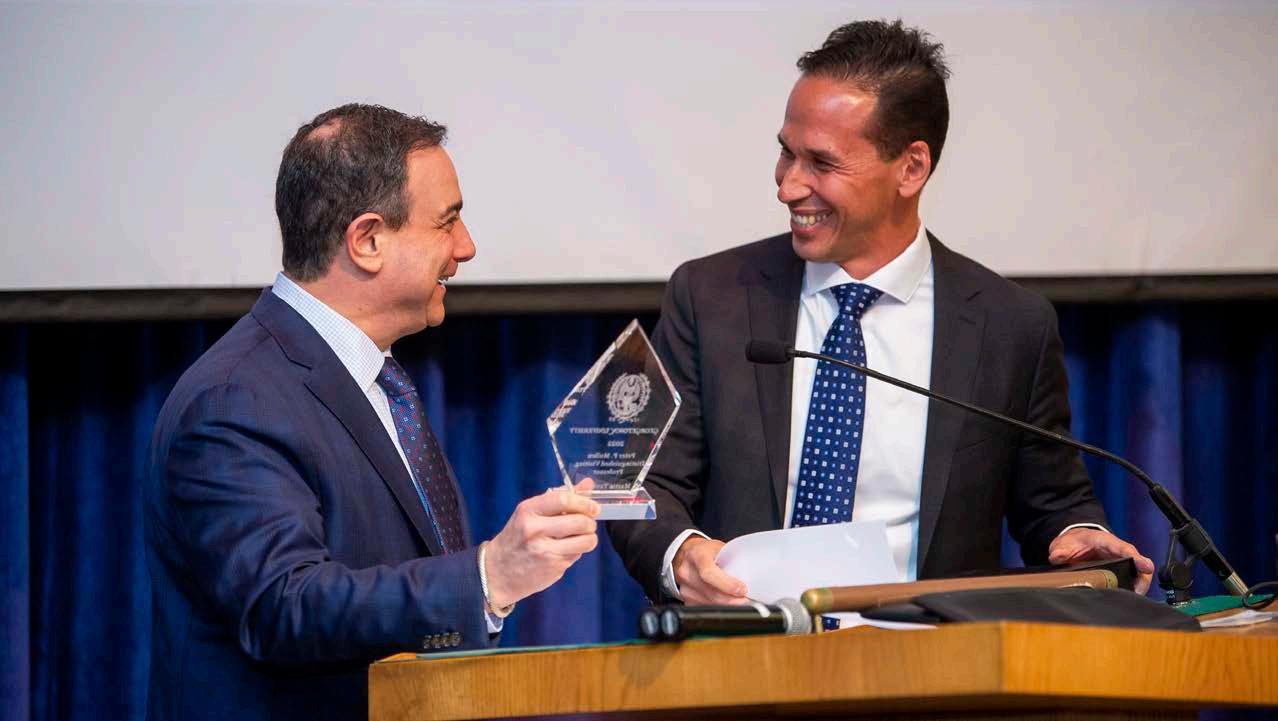

In addition to teaching Making an Exoneree, Tankleff is a criminal defense attorney and leading voice for wrongfully convicted people. Tankleff himself was wrongfully convicted and ultimately exonerated in the murder of his parents when he was 17 years old. He spent nearly 18 years in prison.
Tankleff and Marc Howard also created the Robert Katzmann Fellowship for a Georgetown senior and course alumnus to serve as a teaching and research assistant for Making an Exoneree. Eleanor “Nell” Haney was the first Katzmann Fellow in the 20212022 academic year, and the position is currently held by Anna Marguleas (C’23).
“Marty’s dedication to promoting criminal justice reform and his advocacy for those wrongly accused exemplify Georgetown’s deep commitment to social justice.”
-Anthony Arend, Chair, Department of Government
PJI welcomed two new program associates to the team, both returning citizens committed to criminal justice reform.
Colie “Shaka” Long and Arlando “Tray” Jones III joined the PJI staff
less than a month after they were released from prison – coincidentally both on July 29, 2022 after 26 and 37 years, respectively. During their incarceration, both men became standout students and leaders, including in PJI programs.
Long excelled in several Georgetown courses he took through the Prison Scholars Program at the D.C. Jail, where he also served as a leader in the Young Men Emerging mentorship program. Long is also an author, advocate, and Justice Reform Fellow at FAMM.
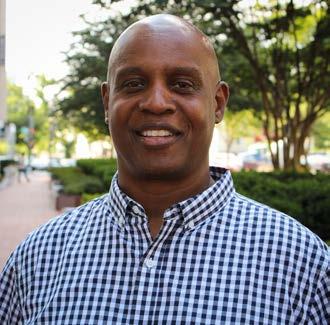
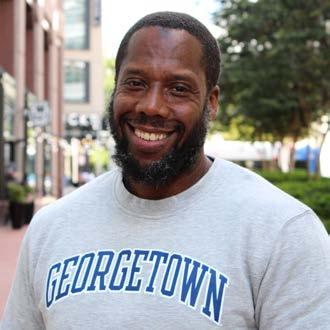
“This is the first page to a new chapter in my book of life,” Long said. “I’m so looking forward to working with PJI and gaining the opportunity to pay it forward to other returning citizens.”
Jones was a recurring student and impactful guest speaker in Marc Howard’s classes both on campus and at the Jessup Correctional Institution in Maryland. He holds a bachelor’s degree in Applied Psychology from Coppin State University and is also passionate about philosophy. Wrongfully convicted at 16 years old, Jones has shared his story through two autobiographical books and a 2021 Making an Exoneree investigation and documentary.
“I feel honored and privileged to have an opportunity to advance the noble mission of PJI, because I am intimately aware of how necessary and vital work like this is to wrongfully convicted and unjustly treated people in the prison system,” Jones said.
The new program associate positions create an opportunity for PJI to bring on more staff members with personal experience in the criminal legal system. In their roles, Long and Jones each support PJI programs, students, and alumni with administrative responsibilities and reentry support.
PJI and the Pivot Program moved into a new home at 509 7th St. NW in Chinatown. With three floors and multiple classrooms and offices, the new space provides plenty of room for our current programs – plus a chance to grow. We look forward to hosting students, faculty, friends, and guests in the year to come.
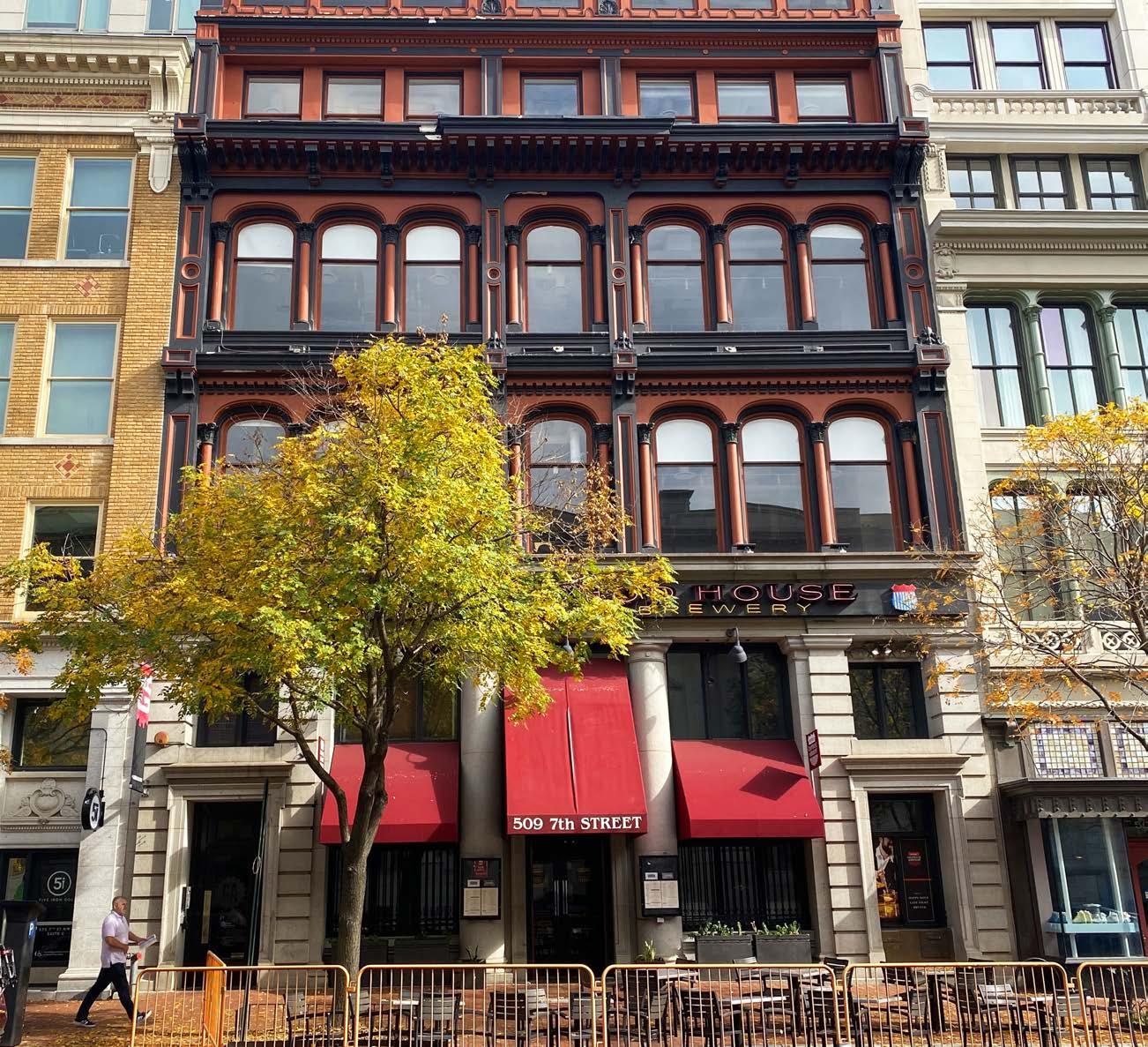

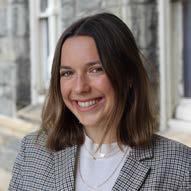
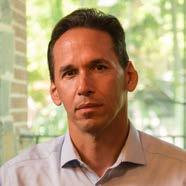
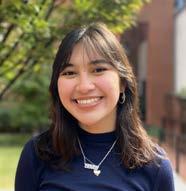

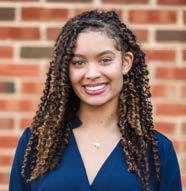
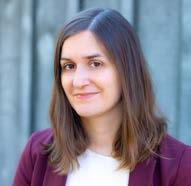
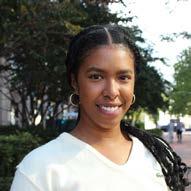
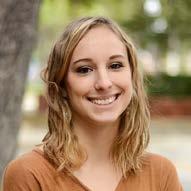
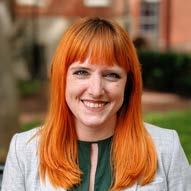
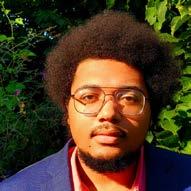
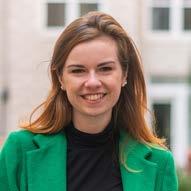


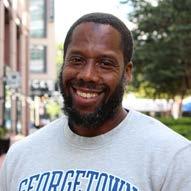

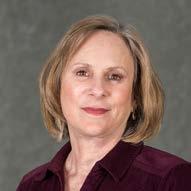
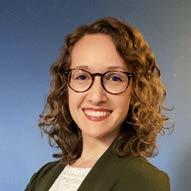

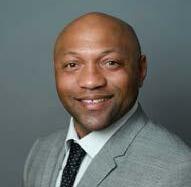
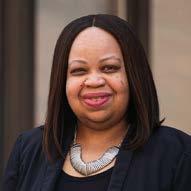

Top left: Arlando “Tray” Jones III, Eleanor “Nell” Haney, and Georgetown students meet with Georgetown President John DeGioia and House Speaker Nancy Pelosi at the Hoyas on the Hill event.
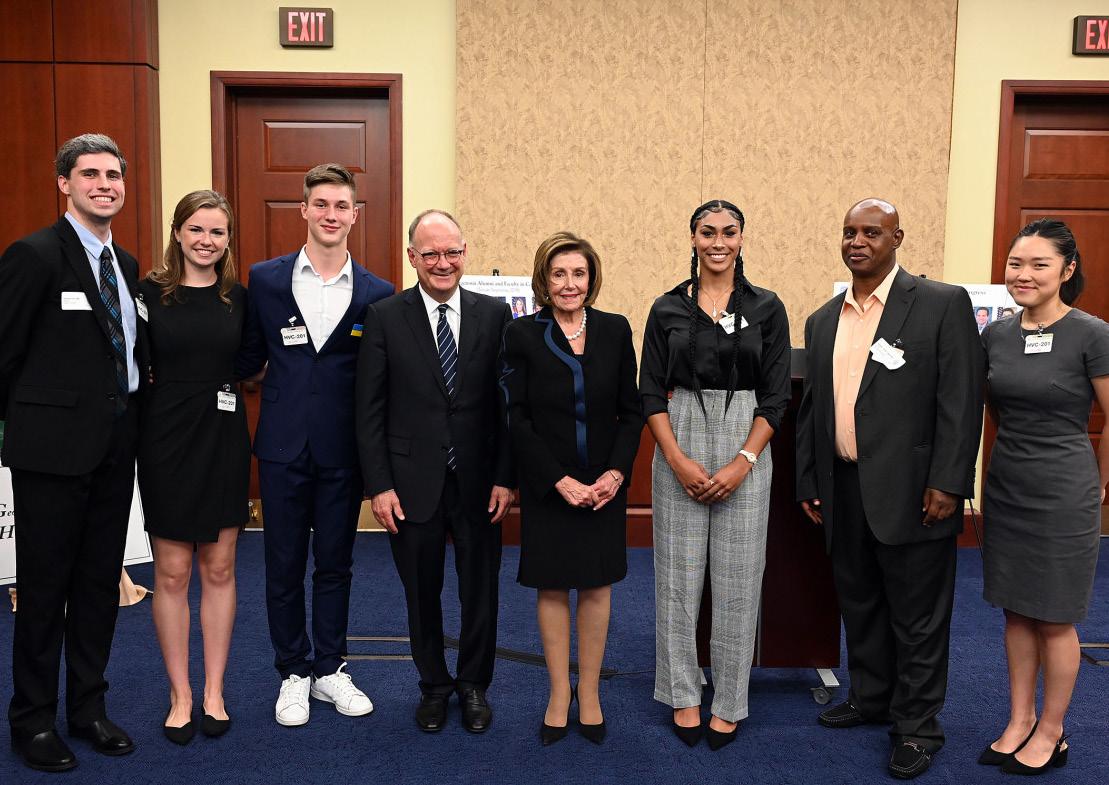
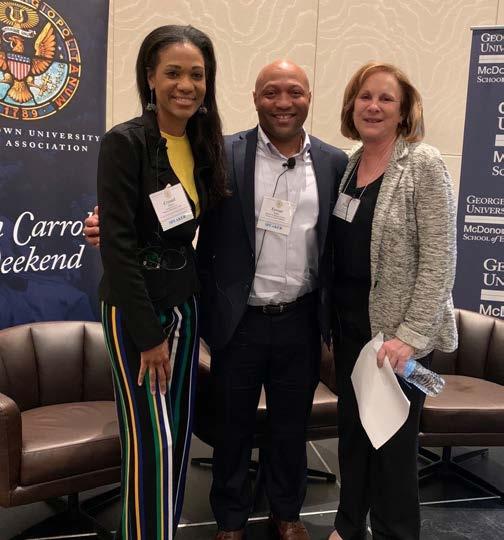
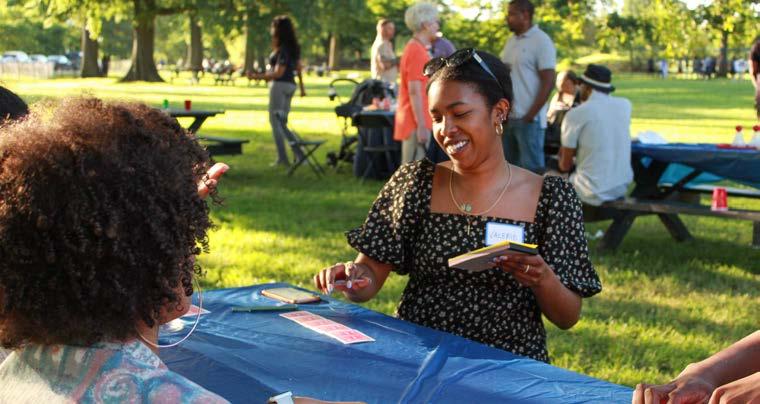
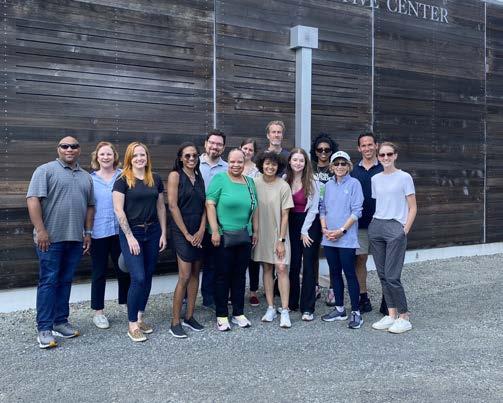
Top right: Crystal Francis, Tyrone Walker, and Pietra Rivoli at John Carroll Weekend in Nashville.
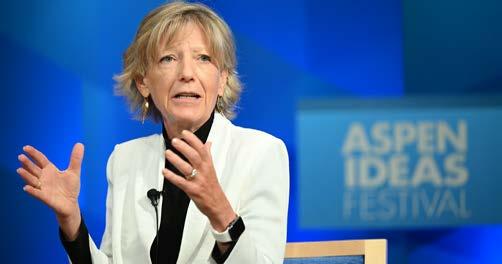
Bottom right: Valerie Coats plays spades with colleagues at the PJI alumni summer cookout.
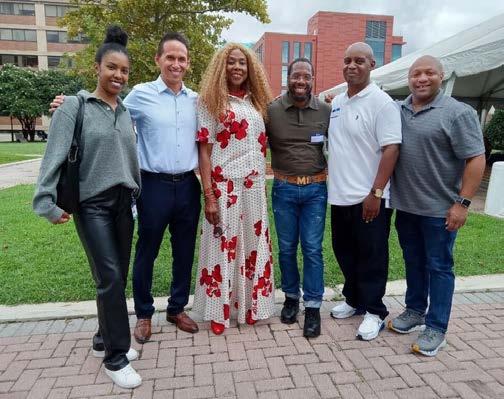
Bottom left: PJI and Pivot staff attend a team retreat at the Calcagnini Contemplative Center.
Top center: Pivot Program Executive Director Alyssa Lovegrove speaks at the Aspen Ideas Festival.
Bottom center: Members of the PJI team with Georgetown Vice President of Institutional Diversity and Equity Rosemary Kilkenny at a staff appreciation event.
Georgetown University Prisons & Justice Initiative